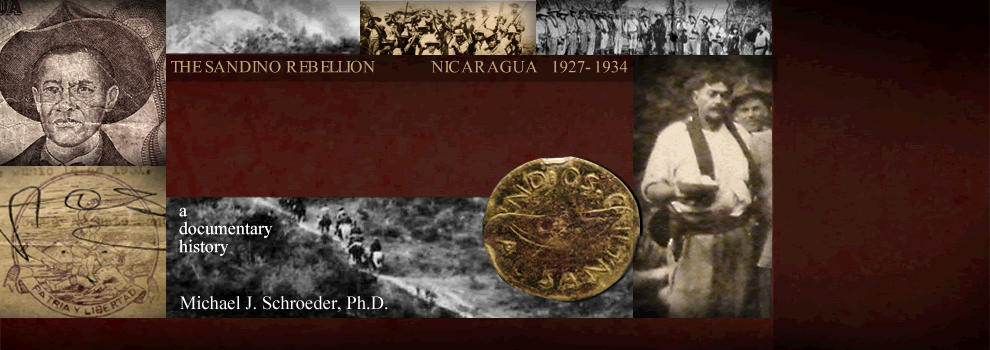| |
|
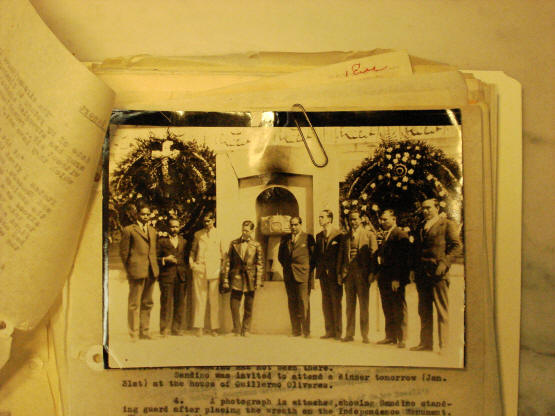 Page
12 & Conclusion
of Fat File on Sandino Situation,
US Military Intelligence Division, 1928-33 Page
12 & Conclusion
of Fat File on Sandino Situation,
US Military Intelligence Division, 1928-33
Documents are presented
here in their original sequence as found in three bulging file folders
titled "Sandino Situation,"
Record Group 165, Entry 77, Box
2653, US National Archives II,
College Park MD.
Grateful appreciation is extended to Mr. Brandon Ray,
Summa Cum Laude college graduate from
Ashford University in Iowa (with a B.A. in
History and a minor in Political Science) for
his exacting transcriptions on this page and the
previous eleven pages. Thank you Brandon!
|
|
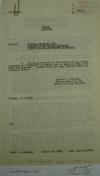
|
1. June 14, 1932.
Captain Robert E. Cummings, Acting Military Attaché, trans.
of "Sandino will not stop
fighting until the Americans
leave,"
Excelsior,
Mexico City, June 13, 1932, p.
1.
"G-2 Report ¶ 3850-a ¶ MEXICO ¶
POLITICAL ¶ SUBJECT: Foreign
Relations, Etc. ¶ Relations with
Foreign Countries: ¶ SANDINO and
the Nicaraguan Situation. ¶ 1.
Forwarded herewith is
translation of an article
appearing in “EXCELSIOR” of
Mexico City on June 13, 1932,
carrying the headline: “Sandino
will not stop fighting until the
Americans leave.” ¶ Robert E.
Cummings, ¶ Captain, Infantry,
DOL ¶ Acting Military Attaché. ¶
Source: As stated. ¶ C/p ¶ From:
M.A.Mexico. ¶ Report No. 3983 ¶
Date: June 14, 1932. . . . "
|
|
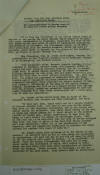
|
2. June 14, 1932.
Captain Robert E. Cummings,
Acting Military Attaché, trans.
of "Sandino will not stop
fighting until the Americans
leave,"
Excelsior,
Mexico City, June 13, 1932, p.
2.
" . . . (Translation) ¶ SANDINO
WILL NOT STOP FIGHTING UNTIL THE
AMERICANS LEAVE. ¶ His
representative in Mexico says it
is time the Yankee policy
changed ¶ “It is time the
Government of the United States
tried to explain to its people
the moral reasons which compel
it to maintain armed
intervention in Nicaragua,
especially now that it has been
demonstrated that after 20 years
of ignominious occupation,
characterized by bloodshed, the
Nicaraguan people, as in 1912,
still resolutely face the
foreign bayonets, while the huts
of peasants, which serve as
targets for the planes of the
American Navy, go flying to
pieces through the air.” ¶ The
foregoing, from Dr. Pedro José
Zepeda, General Representative
of the “Ejercito Defensor de la
Soberanía Nacional de
Nicaragua”,- who further stated:
¶ “Our invincible chief, General
Augusto Sandino, is determined
to continue, without truce, his
gigantic effort to secure the
most complete national liberty,
and if, to accomplish this, it
should become necessary to
resort to extreme military
measures, he will doso [do so],
but not until everything
possible has been done to avoid
useless bloodshed. Now, more
than ever, the people are
organized to cooperate with our
Army. Serious men of recognized
military prestige are joining
the autonomist movement, which
explains the recent arrival of
General Manuel M. Valladares at
the camp of our heroic General
Gregorio Colindres who told me
in a recent letter that 134 men
from the National Guards had
presented themselves to join his
ranks, bringing with them seven
machine-guns and a large
quantity of arms and
ammunition.” ¶ Dr. Zepeda smiled
maliciously when we spoke of the
triumphs boasted from Managua
and from Washington, and said: ¶
“If that were true, there would
not be a single soldier of
General Sandino left. Our boys
do not give battle unless they
have all the strategic
advantages, and as our troops
are always taking the offensive,
they never shoot wildly in the
air, as there are strict orders
not to shoot except at the
precise instant of taking aim,-
always endeavoring to take from
the enemy at least double the
number of cartridges fired. Only
in this way can it be explained
that our Army is better equipped
than ever, and that in spite of
the fact that flying columns
have been duplicated, there are
in the storehouses of the
Segovias, arms and ammunition
sufficient to continue our armed
protest for another five years
if need be.” ¶ Dr. Zepeda spoke
with optimism as to the future
of his country. He believes that
an era of true peace and
prosperity is approaching, and
says the day is not far off when
the doors of all the schools
will again be opened. “I am
confident”, he added, “that the
worthy Nicaraguans, who have for
so many years tasted the
bitterness of exile, will return
to their homes and will bring
with them their accumulation of
observations and studies. There
is need, in Nicaragua, of the
cooperation of all good minds.
Many schools must be established
. . . "
|
|
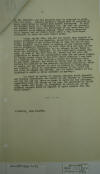
|
3. June 14, 1932.
Captain Robert E. Cummings,
Acting Military Attaché, trans.
of "Sandino will not stop
fighting until the Americans
leave,"
Excelsior,
Mexico City, June 13, 1932, p.
3.
" . . . in the Interior, and the
peasants must be prepared to
cultivate the soil. General
Sandino’s dreams must be
realized by labor legislation in
accord with modern tendencies.
We want the minimum wage, as a
Government law, and that the
peasants and workmen shall enjoy
the privileges of the seven-hour
day, now unknown in my unhappy
country, where foreign companies
still impose ten and twelve
hours labor a day, with wages
inadequate to cover the most
urgent needs. ¶ “Señor Adolfo
Díaz, who for the fourth time
aspires to become President of
the Republic, supported by the
Conservative Party, is going to
the United States to seek the
aid of Wall Street bankers, and,
as there is nothing in the
country which can be pledged, as
security, he will offer five per
cent of the salaries of public
employees, in the attempt to get
funds to start his electoral
campaign. On the other hand,
General Moncada, in view of the
fact that Mr. Hoover did not
give him permission to extend
his presidential term for two
years longer, is taking urgent
steps in New York toward
securing a new loan, of a
million and a half dollars,-
surely for expenses which he can
never justify, but which he
states will be used to entertain
the members of the American
Electoral Commission, which is
coming –to our sorrow- to give
us lessons in ‘democracy and
liberty’, while in Washington,
veterans of the World War are
dying of hunger and poverty, and
the brutal murder of Col.
Lindbergh’s child is still
shrouded in mystery.. ¶ “It
would be better if Colonel
Stimpson [Stimson] would
honestly and frankly acknowledge
his defeat in the tragedy of
Nicaragua, and for one and all
leave us alone to solve our own
problems, cancelling with one
stroke of the pen, the ambitions
of Adolfo Díaz, whose only
claim, in attempting to govern
us, is the criminal support
which he expects to again
receive from the White House.” ¶
EXCELSIOR, June 13, 1932."
|
|
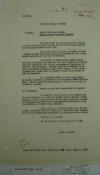
|
4. June 9, 1932.
Alex A. Cohen, in the absence of
the Military Attaché, Costa
Rica, translations of
El
Imparcial, Guatemala, and
La Prensa, El Salvador.
"G-Report. ¶ 2700. ¶ NICARAGUA
(Pop. & Social) ¶ Subject:
Public Order and Safety. ¶ Press
Notices regarding Sandino. ¶ “El
Imparcial” of Guatemala states
that in a recent encounter with
Guardia forces in Nicaragua
Sandino was seriously wounded in
one arm. ¶ It is also stated
that he recently received a
supply of arms which was landed
in Tamarindo in the swampy
region bordering on the Gulf of
Fonseca. ¶ “La Prensa” of
ElcSalvador [El Salvador] openly
states that the Nicaraguan
Liberals are the ones supporting
Sandino, and more especially the
Liberal emigradoes in Honduras,
El Salvador and Guatemala.
Toribio Tijerino is claimed to
be one of Sandino’s principal
agents even though at the outset
Tijerino was turned down by
Sandino because he had been “a
bad Conservative”. ¶ Dr.
Alejandro Cerda, a Nicaraguan
living in Danlí, Honduras is
claimed to be surgeon-in[-]chief
for Sandino. There, safe from
persecution he takes care of all
of Sandino’s wounded. ¶ Women
are now used exclusively by
Sandino as messengers. ¶ Yet
another report states that
Sandino and Manuel Valladares
are going to launch General
Horacio Portocarrera, a
Nicaraguan liberal who for many
years resided in Guatemala and
Honduras as provisional
President of a new revolutionary
movement being planned. ¶ There
seems to be little doubt that
the Dr. Cerda, mentioned above
is acting as a go-between for
Sandino. He has been prominently
mentioned as such quite often
lately. ¶ Sources: As stated. ¶
IN THE ABSENCE OF THE MILITARY
ATTACHÉ: ¶ Alex A. Cohen. ¶
From: M.A. Costa Rica ¶ Report
No. 16[unreadable] ¶ Date: June
9, 1932."
|
|
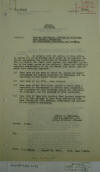
|
5. June 7, 1932.
Captain Robert E.
Cummings, Acting Military
Attaché, Mexican press reports
on activities of Pedro José
Zepeda & Nicaraguans & Sandino
supporters in Mexico, p. 1.
"G-2 Report ¶ 3850-a ¶ MEXICO ¶
POLITICAL ¶ SUBJECT: Foreign
Relations: Status of Relations
with Foreign Countries: ¶ The
Nicaraguan Situation, and
Sandino. ¶ 1. In keeping with
policy of this office to inform
G-2 of everything which might be
of possible interest concerning
the activities of Sandino’s
representative in México, Dr.
Pedro José Zepeda, and articles
appearing in the local press on
the subject,- there are
forwarded herewith translations
of the following four press
articles which have recently
appeared: ¶ (1) News item of May
28th in which Dr. Zepeda is
quoted concerning the coming
elections in Nicaragua and the
relations of the United States
thereto. ¶ (2) News item of May
30th – same subject. ¶ (3) News
item of May 31st which quotes a
letter from a Committee of
Nicaraguans in Mexico City
concerning the candidacy of Juan
Bautista Sacasa for President of
Nicaragua, and its support of
this candidate. ¶ (4) News item
of June 1st. quoting from
letters received in Vera Cruz
alleged to have been written by
officers associated with
Sandino, describing the success
of the latter’s movements. ¶
Robert E. Cummings, ¶ Captain,
Infantry, DOL ¶ Acting Military
Attaché. ¶ Source: Press. ¶ C/p
¶ From: M.A.Mexico. ¶ Report No.
3973. ¶ Date: June 7, 1932. . .
. "
|
|
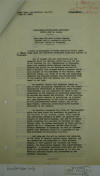
|
6. June 7, 1932. Captain Robert E.
Cummings, Acting Military
Attaché, Mexican press reports
on activities of Pedro José
Zepeda & Nicaraguans & Sandino
supporters in Mexico, p. 2: Translation of "Nicaraguan
Nationalists Repudiate Doctor
Juan B. Sacasa,"
El
Universal Gráfico, Mexico
City, May 28, 1932.
" . . . (News item – EL
UNIVERSAL GRAFICO) ¶ (May 28,
1932) ¶ (Translation) ¶
NICARAGUAN NATIONALISTS
REPUDIATE DOCTOR JUAN B. SACASA
¶ They make the most serious
charges against him in
connection with his political
action in Nicaragua ¶ A group of
Nicaraguan citizens headed by
Doctor Pedro A. Zepeda today
made the following statements
regarding matters in Nicaragua:
¶ Out of respect for our
convictions and the sympathy
which the Mexican nation has had
for all of us fighting for the
independence of Nicaragua, under
the standard which General
Augusto Cesar Sandino has raised
in the Segovias, we wish to draw
a definite line between certain
elements which have rallied to
the candidacy of the traitor,
Juan Bautista Sacasa, and those
of us who are vigorously
opposing the alliance between
the disinherited sons of our
country with the Yankees who
have intervened in our land. ¶
We consider Doctor Juan Bautista
Sacasa as one of those
principally responsible for the
recent unfortunate occurrences
in Nicaragua under foreign
intervention, and his intention
to climb to the presedency
[presidency] of our Republic in
elections supervised by marines
who murder our brothers in the
Segovias, from the secure
heights of aeroplanes, we
consider as a new demonstration
of the lack of patriotism of the
aforementioned Doctor Sacasa,
one of the many vulgar,
ambitious politicians
unfortunately abounding in our
country. ¶ We consider laughable
the title of “Nationalist” which
has been given the candidate in
question by the traitors of our
country, since, after heading
the liberating movement of 1926,
he approved the treason of José
María Moncada, and had no
scruples about accepting the
position of Minister in
Washington, when the Yankee
Department of State had reported
him as a “dangerous outlaw” when
he was titular President of
Nicaragua in Port of Cabezas.
Doctor Juan Bautista Sacasa is a
specimen of the most shameless
Nicaraguan traitors. ¶ And once
and for all we declare our
adhesion to the Cause of General
Augusto Cesar Sandino, and our
unswerving determination to
fight without ceasing or rest
against the traitors and their
allies, the intervening Yankees
(los interventores yanquis). A
profound patriotic sentiment and
civic pride has maintained and
maintains us in this unwavering
attitude before the misfortune
of our country, Nicaragua."
|
|
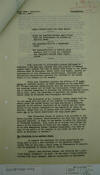
|
7. June 7, 1932. Captain Robert E.
Cummings, Acting Military
Attaché, Mexican press reports
on activities of Pedro José
Zepeda & Nicaraguans & Sandino
supporters in Mexico, p. 3: Translation of "Henry Stimson
Makes His Words Tragic,"
Excelsior, Mexico City, May
30, 1932, p.
1.
"(News item – EXCELSIOR – May
30, 1932.) ¶ (Translation) ¶
HENRY STIMSON MAKES HIS WORDS
TRAGIC ¶ While the American
Marines were firing upon the
Nicaraguans, he offered an
Octavian peace ¶ The elections
will be a sanguinary farce ¶ The
Representatives of Sandino again
declares that he will not
recognize the President elected
under supervision ¶ With
reference to telegraphic reports
published by EXCELSIOR a few
days ago, stating that the
soldiers of General Augusto
Cesar Sandino had been in combat
with forces of the
North-American Navy in
Nicaragua, Doctor Pedro José
Zepeda, general representative
of this Nicaraguan
revolutionist, yesterday made
interesting observations
regarding the attitude of the
United States in the affairs of
his country. ¶ While some
telegrams reported the killing
of 17 Sandinistas by American
planes, in other telegrams of
the same date Mr. Stimson
declared categorically that the
North-American soldiers had
received orders not to fight the
Nationalist forces again and to
confine themselves to guarding
the electoral polling places,
adding that, after the elections
in question, the United States
forces would be withdrawn from
Nicaraguan territory. ¶ “The
statements of Mr. Stimson”,
Doctor Zepeda told us, “do not
agree with the acts of his
soldiers in Nicaragua. For
twenty years the United States
has been exercising a shameful
hegemony in the affairs
(destinos) of my country and the
insincerity of the recent
statements of the Secretary of
State is obvious, though they
are in accord with the policy
pursued (conducta que se ha
venida observando) for many
years past. ¶ “The Liberating
Forces of Sandino were attacked
by the North-American invaders,
notwithstanding the fact that
the former remained inactive, at
least in the sector to which the
telegrams of EXCELSIOR referred.
This leads us to believe that
either the orders of the
Secretary of State are not
obeyed, or that it has to do
with understood values (valores
entendidos), for what he says to
the public of his country is one
thing and what is ordered in
Nicaragua is another.” ¶ The
Elections to be another Farce. ¶
As regards the elections for
which preparations are being
made to name a new President of
the Republic, Doctor Zepeda told
us that only a small group of
Nicaraguans is supporting the
candidacy of Doctor Juan B.
Sacasa. ¶ “Doctor Juan Bautista
Sacasa, who formerly was a
political leader (bandera)”, he
said, “is now only a tramp
(guiñapo) serving José Maria
Moncada, whom he represented in
Washington, . . . "
|
|
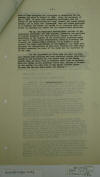
|
8. June 7, 1932. Captain Robert E.
Cummings, Acting Military
Attaché, Mexican press reports
on activities of Pedro José
Zepeda & Nicaraguans & Sandino
supporters in Mexico, p. 4: Translation of "Henry Stimson
Makes His Words Tragic,"
Excelsior, Mexico City, May
30, 1932, p.
2.
" . . . both of them betraying
the principles of redemption for
the country for which we fought
in 1926. After the surrender of
May 4, 1927, in which they
shamefully trafficked with the
rifles of the Constitutionalist
Army, Moncada and Sacasa joined
forces; and if these two
‘personages’ have now become
estranged it is because the
former has wished to be
reelected while the latter is
awaiting the reward for his
unconditional servitude. ¶ “To
us, the Nicaraguan Nationalists,
neither of the candidates
mentioned, for many reasons,
possesses the qualities of
dignity necessary for that
position, because the fact of
submitting to the holding of the
presidential elections under the
heel of Yankee armed
intervention, under an electoral
law dictated and imposed bythe
[by the] invaders, is in itself
a crime against the basic
institutions of the Republic,
for whose sovereignty and
independence we have been
fighting for five years without
measuring the power of the enemy
nor the sacrifice of of our
army. ¶ “If the Department of
State does not open its eyes and
insists upon carrying out that
electoral farce, which will
result in the selection for the
fourth time of the famous Adolfo
Díaz, we shall have no recourse
other than to continue with our
rifles on our shoulders until
real liberty is brought to the
nation, in order that it may
select without interference the
men who shall guide its
destiny.”"
|
|
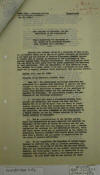
|
9. June 7, 1932. Captain Robert E.
Cummings, Acting Military
Attaché, Mexican press reports
on activities of Pedro José
Zepeda & Nicaraguans & Sandino
supporters in Mexico, p. 5:
Translation of "The Problems of
Nicaragua and the Activities of
the Nicaraguans,"
El
Universal Gráfico,
afternoon edition, May 31, 1932, p. 1.
"(News item – Afternoon edition
of EL UNIVERSAL GRAFICO – May
31, 1932.) ¶ (Translation) ¶ THE
PROBLEMS OF NICARAGUA AND THE
ACTIVITIES OF THE NICARAGUANS ¶
Those supporting the candidacy
of Dr. Sacasa do so precisely
because they consider him a
patriot. ¶ Offering our columns,
which is a principle of this
daily, to all matters which are
or may be of public interest, we
published a few days ago the
opinion of certain Nicaraguan
elements opposed to Doctor Juan
B. Sacasa, an aspirant to the
presidency of that country
crushed under foreign
intervention. This note called
forth the one which we give
below from the group supporting
the candidacy of that
politician. With the publication
of this letter we bring the
incident to a close, since it is
also a principle of this
newspaper not to support
polemics which degenerate into
personal matters. ¶ Mexico,
D.F., May 30, 1932. ¶ Director
of EL UNIVERSAL GRAFICO, City. ¶
Dear Sir: The undersigned
pro-Sacasa Committee was
authorized in a meeting held
yesterday to address you with
respect to the article published
in EL UNIVERSAL GRAFICO relative
to our activities in support of
the candidacy of Doctor Juan
Bautista Sacasa for the
presidency of the Republic of
Nicaragua. We respectfully
request the publication of the
following statements: ¶ I. We
shall not start a discussion
between those persons and
ourselves, not because we fear
the discussion but so as not to
grant them the moral or
intellectual prestige which such
recognition would give them.
Furthermore, we do not wish to
aid them in their desire for
publicity, nor make a display of
our disagreement in a family
matter, as are all things
relating to the internal
policies of Nicaragua. ¶ II. But
as a satisfaction to the Mexican
nation, which has demonstrated
on many occasions its sympathy
for Nicaragua in its hours of
trial, we declare now and
possibly this time only that our
program rests upon a genuine
aspiration for autonomy for our
unfortunate country, without
those farces which are as
prejudicial as the labors of
deliberate traitors; without
vain boasts which are nothing
more than a pretext for all
manner of exploitations in the
guise of genuine patriotism. ¶
III. We are supporting the
candidacy of Doctor Sacasa
because we consider him, from an
intimate knowledge (of his
character), to be one of the few
men who will REALLY work for the
rehabilitation of our country
internationally, morally, and
financially, which it is
imperative to accomplish with
dignity, after more than twenty
years of disgrace. We have proof
that we are placing our hopes .
. . "
|
|
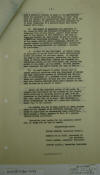
|
10. June 7, 1932. Captain Robert E.
Cummings, Acting Military
Attaché, Mexican press reports
on activities of Pedro José
Zepeda & Nicaraguans & Sandino
supporters in Mexico, p. 6:
Translation of "The Problems of
Nicaragua and the Activities of
the Nicaraguans,"
El
Universal Gráfico,
afternoon edition, May 31, 1932,
p. 2.
" . . . upon a potential reality
in spite of the difficulties
which are apparent to the
discerning, in these times when
the obscure and insignificant
would make use of the worn-out
measure of publishing boastful
statements to raise themselves
to a position which they cannot
support with facts. ¶ IV. Our
object in supporting the
candidacy of Dr. Sacasa is that
the territory of Nicaragua may
be liberated from foreign
forces, against which forces
most of the members of this
Committee, and many of those who
support it, have fought in all
the fields of civic activity
(actividad ciudadana): in the
trenches and in the press,
without asking recompense,
without appearing abroad as
worthy of consideration, without
exploiting the martyrologists
nor enjoying a monopoly on
patriotism. ¶ V. We want the new
Government of Doctor Sacasa in
Nicaragua to be one which will
build substantially within and
extend its horizons abroad: by
amending the laws as the times
demand, abolishing the
limitations on public education;
opening new channels for
industrial rights, in the first
place, and lifting the spirit of
the youth, in the second. We
have learned much regarding the
matter during our stay in
Mexico. ¶ VI. We shall demand of
Doctor Sacasa that he resume
official relations with the
Government of Mexico for many
imperative reasons of affection
and justice. And, in fulfillment
of a profound desire now general
among our compatriots, we shll
[shall] ask that proofs of the
most pure Central American unity
shall inspire all his acts in
case he is raised to power. ¶
These are the essential points
of our work. We request the
hospitality of the columns of
the popular daily which you so
worthily direct to make this
explanation to the Mexican
readers, not to our countrymen,
who, while few, to be sure, take
advantage of every circumstance
to boast of a power and standing
which they do not possess. ¶ We
promise you not to take notice
of those persons again in the
columns of EL UNIVERSAL GRAFICO,
for it would be equivalent to
encouraging their activities,
which pursue a course opposed to
that of a genuine liberty-loving
patriotism. ¶ Entreating your
pardon for the annoyance caused
you, we thank you and beg to
remain, ¶ Respectfully yours, ¶
HERNAN ROBLETO, Secretary
General. ¶ ROGERIO DE LA SELVA,
Secretary of the Interior. ¶
JORGE SALINAS, Secretary
Treasurer. ¶ ALBERTO SALINAS,
Recording Secretary."
|
|
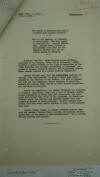
|
11.
June 7, 1932. Captain Robert E.
Cummings, Acting Military
Attaché, Mexican press reports
on activities of Pedro José
Zepeda & Nicaraguans & Sandino
supporters in Mexico, p. 7: Translation of
"The Rebels of Nicaragua Now
Form a Powerful Body (Legion
Poderosa),
La Prensa,
Mexico City, June 1, 1932.
"(News item – LA PRENSA – June
1, 1932.) ¶ (Translation) ¶ THE
REBELS OF NICARAGUA NOW FORM A
POWERFUL BODY (LEGION PODEROSA)
¶ They do not operate, as
formerly, in small bands. Now
they engage in real battles.
Several battles won. Augusto
Cesar Sandino is now stronger
than ever and his complete
triumph over the invading hordes
is imminent. ¶ VERACRUZ, May
29.- Señor Enrique Rivera
Beltran, President of the
Society “Hands Off of
Nicaragua,” today received a
letter written on the field of
operations of the “Army
Defending the National
Sovereignty of Nicaragua” and
signed by General Francisco
Estrada, who represented General
Cesar Augusto Sandino on a
recent military expedition. ¶
General Estrada says that the
Sandinistas continue advancing,
that they control, to date, a
great zone which extends to the
interior of the country, and
that at present not only are the
Sandinista forces engaging in
guerrilla warfare but regular
field action in which several
battalions and regiments
participate. ¶ During the
expedition, the column traversed
the provinces of Jinoteca
[Jinotega], Dhinandega
[Chinandega], Leon, and a part
of Managua, having strong
encounters in which they were
victorious, the principal ones
having been those at Las
Labranzas, El Jasmin and
Ficaral, where the national and
invading guards were completely
dispersed on being defeated.
General Estrada also states that
they found public opinion in
their facor [favor] wherever
they went. ¶ Another letter
signed by Colonel Socrates
Sandino says that his brother,
General Cesar Augusto, is
enjoying perfect health and, in
the words of that revolutionary,
“he is strong, fat and glowing
with health.”"
|
|
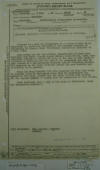
|
12. June 3, 1932.
Military Attaché, Tegucigalpa,
"Political Activities of
Nicaraguans Residing in
Honduras."
"Enclosed is a copy and
translation of a letter written
by M. Balladares M., which was
delivered to the American
Legation at Tegucigalpa by
Alberto Gamez (Nicaraguan
resident in Honduras) on 1 June,
1932. ¶ This letter and two
letters, translations of which
were forwarded with Naval
Attaché report #56-32, dated 28
May, 1932, were alledgedly
[allegedly] written by
Balladares while at the camp of
Juan Gregorio Colindres in
Nicaragua and are part of his
propaganda and plan to join
Sandino in a revolutionary
movement against President
Moncada. The signature on the
above mentioned letter has been
verified and is believed to be
genuine. ¶ Gamez has been
friendly with this legation and
this fact which is probably
known to Balladares would tend
to substantiate the opinion of
the Naval Attaché that all three
letters were written for the
express purpose of coming into
the possession of this office. ¶
Gamez delivered also a copy of
his reply to Balladares, (copy
and translation enclosed). ¶
COPY FURNISHED: Sec. Brigade,
Managua, ¶ Guardia”"
|
|
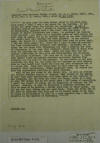
|
13. May 20, 1932.
"Extracts from personal letter
of 1st. Lt. W. L. Bales, USMC,
NNG., to Lt. Col. R. L. Denig,
USMC, dated 20 May 1932."
"Extracts from personal letter
of 1st. Lt. W. L. Bales, USMC.,
NNG., to Lt. Col. R. L. Denig,
USMC., dated 20 May 1932: ¶
“****** We have also had some
severe jolts in the past year.
Last month – April – was a bad
month for the Guardia. It was by
far the worst since the Guardia
was organized. We had 4 officers
killed and lost 7 automatic
weapons and quite a bunch of
ammunition, together with a few
other odds and ends. Of course
it wasn’t altogether one sided.
We punished the bandits quite
heavily – Lt. Hamas did a
splendid piece of work during
the last week in April, and in
my opinion broke up the most
threatening bandit move that
Sandino has ever planned. As you
perhaps know, the threat of a
genuine revolution down here is
quite real, I for one fully
expect it. There was a plan on
foot to coordinate this
revolutionary movement with
Sandino. An outfit was to cross
the Rio Negro into Chinandega
and make a raid on the town of
Chinandega at the same time
Sandino’s Jefes were to swing
down from the Segovias and hit
Leon. Money and loot were the
immediate objectives in this
move and forestalling the
elections the secondary
objective. The raid was to be
May 15th. I think that Hamas’
fight at Gambuco mountain
prevented Sandino from carrying
out his part of the program. He
was broken up and disorganized
and then the big thing was he
expended so much ammunition in
that 3-1/2 hour fight that his
May 15th offensive had to be
called off. They felt quite safe
in that camp and free to
organize their operations. Hamas
surprised them. Of course you
know the approximate location of
Cerro Gambuco. ¶ Well we are not
clear of the threat yet. As soon
as Sandino can collect another
supply of “parque” they intend
to try again. We have very good
information that some where in
the vicinity of San Bernardo,
not far from the lower Rio
Negro, there is a dump of some
700 rifles and so the story goes
– 230 cases of ammunition. I
doubt the number of cases, but
am beginning to believe the 700
rifles. However, we hope to
forestall a combined movement
now that we seem to be getting a
fairly good line on their plans.
But you can see that things are
not easy here. There are those
who do not want an election this
Fall and it is fairly clear to
me that if there is an election
it will be a most eventful one –
the most eventful in the History
of Nicaragua. ******” ¶ 5/25/32
rbh"
|
|
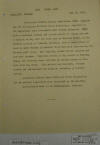
|
14. May 25, 1932.
U.S. Navy Press Room, press
release on National Guard &
civico patrol military contact
with large group of bandits
under Pedro Altamirano at
Neptune Mine on May 23.
"NAVY PRESS ROOM ¶ IMMEDIATE
RELEASE ¶ MAY 25, 1932. ¶
Lieutenant Colonel Calvin B.
Matthews, USMC, commanding the
Nicaraguan National Guard
Detachment, reported to the
Department that Lieutenant Earl
T. Gray [not to be confused with
Earl Grey tea], (Corporal, USMC)
with a combined Guardia and
civico patrol of twenty men had
a contact on May 23rd one mile
west of Neptune Mines, in the
western section of Jinotega
province, with a large group of
bandits under Pedron Altimarino
which had been threatening the
Guardia post there. The fighting
lasted thirty minutes and was
very intense. Upon the return of
the patrol to Neptune Mines, the
barracks were attacked by
another group of bandits from
the north. This attacked was
repulsed. Planes bombed and
redispersed the bandits,
breaking up further attack. ¶
Seventeen bandits were killed in
these encounters, but no serious
casualties were sustained by the
Guardia. ¶ Lieut. Gray’s home is
in Indianapolis, Indiana."
|
|
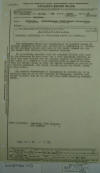
|
15. May 28, 1932.
Military Attaché, Tegucigalpa,
"Political Activities of
Nicaraguans Living in Honduras"
"The enclosures hereto are
translations of alledged
[alleged] copies of letters
supposed to have been written by
M. Balladares M. Neither of the
original letters were seen by
the Naval Attaché but the two
copies were obtained from
separate sources. ¶ It is
entirely possible that the
original letters were sent to
the addresses in each case, but
a more plausible solutions is
that they were written for the
express purpose of falling into
the hands of a member of this
legation with an idea of
interesting the United States in
what the writer attempts to
picture as a serious movement.
(See Naval Attaché report No.
53-32, dated 20 May, 1932). ¶
The present whereabouts of
Balladares is unknown and it is
possible that he is in the
interior of Nicaragua, however
this office believes that he is
not far from Danlí observing
developments. ¶ COPY FURNISHED:
Sec. Brig. USMC Managua, ¶ and
Guardia ”."
|
|
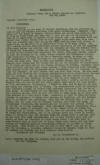
|
16. May 21, 1932.
Translation of Manuel Ballardes
M., Military Camp Luz y Sombra,
to General Francisco Cano,
Chinandega.
"TRANSLATION ¶ Military Camp,
Luz y Sombra (Lights and
Shadows), May 21, 1932. ¶
General Francisco Cano, ¶
Chinandega ¶ My dear brother: ¶
I am now in the camp of General
Colindres, who has received me,
both he and his valiant
soldiers, with great enthusiasm.
Tomorrow I will leave for the
camps of General Sandino which
are eight days distant, all on
foot as these roads are very
bad, I want you and all my
friends to know of my sacrifices
to succeed in my object, and I
am enthused with the belief that
within twenty days we will shake
hands with you, with more than
two thousand men, well equipped;
we have 75 machine guns with
plenty of ammunition, in
addition to an ammunition train
of 50 mule loads. You will
receive letters from different
points announcing to you our
approach eight days before our
arrival with the columns; so
that the columns from El Viejo
and Chinandega joined can take
Chinandega, driving the enemy
out as soon as the forces have
evacuated the plaza, then come
toward Argelia to join the
columns of Dr. Lara, Castro
Wassmer, and Valladares Torrez.
Tell Guillermo Esquivel, as he
has a hacienda guard, to clear
at once for Quezalguaque to take
the arms of the guard at the
distillery, then return and join
you. This is when you receive
orders from me; order Colonel
Nayo Telles and the others who
are on the frontier to
concentrate in El Viejo and hide
out in the fincas awaiting my
orders. Generals Ulloa (two
brothers) already have these
orders; I also recommend that
Generals Juan Herrera Valle and
Altamirano clear Chinandega for
the vicinity of the farm “La
Cruzada”, so that Andres Real
can feed them there. In this
same mail you will receive Ten
thousand proclamations to be
distributed throughout the
country. Tell my daughter
Angelica, one day before
attacking Chinandega, to tell
Humberto to leave with as many
Guardias as will go, so they
won’t catch him with his mouth
open when I arrive, as they
might execute him, but not to
let the young people know until
the last minute so they can
evacuate Chinandega. I trust in
God, but it can not be long now
until our secrets will be known.
The conservative party in
Honduras have prepared a coup,
in accord with Emiliano
(Chamorro) for the 24 of June
next. We have drawn all the
threads, but we are so strong,
and we are counting on you, that
we will not have to turn back,
as we will have them subdued in
a very short time. According to
word we have received, Moncada
is preparing to clear out,
leaving us fighting, and the
Yankee plan to go before the
elections. Tell all our friends
that I will be named, with the
good will of General Sandino,
his staff and army, the
Provisional President, our
intentions are to unite the
Liberal Party, in the war or in
the Assembly. Tell Manuelito
(Manuel Balladares Jr.,) to turn
his power of attorney over to
Dr. Ramon Silva to defend his
interests and if within twenty
days he has not received word,
to come to Danlí via
Tegucigalpa, and go to Alfonso
Irias who lives in Danlí; there
is where we send our letters
from the camps where I now am,
that he may come with José
Montealegre, but to come knowing
what they are doing, as from the
frontier to these camps where I
am they have to come several
days on foot and to bring their
rain coats, and buy wool shirts
and campaign hats in Tegucigalpa
because it is cold in these
mountains. This letter is for
you but if they don’t find you
it is for the Colonels L.
Moncada, Leonardo Telles or
Ricardo Ulloa so that my Leaders
and friends put this movement
into action. ¶ Fatherland and
liberty. ¶ (s) M. Balladares M.
¶ P.S.- Remember to take the
rifles, that are in the attic,
the 30-30’s and the Thompson."
|
|
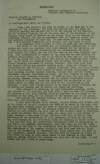
|
17. ca. May 21,
1932. Translation of
Manuel Ballardes M., Military
Encampment of General Juan
Gregorio Colindres, to General
Augusto C. Sandino, His
Encampment, p. 1.
"TRANSLATION ¶ Military
Encampment of General Juan
Gregorio Colindres. ¶ General
Augusto C. Sandino, His
Encampment. ¶ My distinguished
Chief and friend: ¶ This, your
soldier, has come in search of
his idol and of the fondling of
the Americas. The hour has
arrived when the eople [people]
of Nicaragua rectify and believe
you to be the saviour of the
country, of the National
dignity, and at the same time of
the interests of the Liberal
Party which is menaced on all
sides; first by the treason of
mercenary Moncada, who has an
agreement with the opposite
party, who are actually prepared
to fight us. We have drawn all
the threads, and I will explain
everything that occurs, from our
point of view. ¶ I am endosing
[endorsing? endowing?] these
letters so that you know all our
movements. ¶ The whole of the
occident and the remaining
departments of the orient are
ready and awaiting only your
command for the uprising, as I
have sent ten thousand
proclamations for distribution
in which I have changed the
ideas, and are not the same as
the ones Tijerino sent you. This
proclamation is signed by Dr.
Lara and by your brother and
servant (Balladares). Dr. Lara
is in hiding by now, and all the
lions of the van guard who shook
hands with you in Las Mercedes,
have joined us. In El Viejo are
Generals Ulloa (two brothers)
who now lead the forces formerly
commanded by General Cabulla.
They have more than two hundred
rifles and several machine guns.
Among our numbers in Chinandega
are the following: Colonel
Francisco Cano, the first leader
of that Department, a first
cousin of mine; General
Altamirano; Colonel Lino
Moncada; General Higinio
Peralta, Colonel Juan Herrera
Valle; Guillermo Moncada;
Guillermo Esquivel. All this
nucleus of men with more than
four thousand soldiers. In León
we have Dr. Lara with his
prestige; General Castro Wassmer
and the family Balladares
Torres, first cousins of mine.
These men represent the
sentiments of the brave people
of León, and all the rest of the
Departments of the Oriente. I
have sent communications to my
unconditional friends, men of
action and talent, and of social
and financial position. ¶ This
movement is enormous, we have
formidible [formidable] entails,
within and outside of the
country, and very soon I hope to
have the pleasure of presenting
more than fifteen thousand
soldiers in the camps of the
occident to our idol, to the
saviour of the country and of
the party. ¶ Our brother and
beloved friend, Don Alfonso
Irías, has returned from here
with letters of mine. ¶ I have
also written to my friend,
General Ubico, who thinks only
in the Union of Central America,
who told me to count on his help
when the mercenary Moncada plays
his card of treason; he also
minifested [manifested] his
interest in the triumph of the
Liberal Party of Honduras and
Nicaragua, telling me that
without the good will of the
Liberal Party of Nicaragua he
could not effect this great
work; and being such a good
friend of mine, because I have
even cattle business with him,
we should take advantage of the
pretentions of this gentleman so
that he can help us,
notwithstanding his friendship
with the Yankees; as in my
letter I let him know that the
Provisional Government would be
inaugurated by his friend and
servant (Balladares), that our
flag, to let the world know it,
is the flag of the country so
that in its folds we may enroll
the conscience of the people,
reminding you that your red and
black flag of the liberation of
Nicaragua will still float over
the army of the liberator,
General Sandino. For all that we
succeed in doing, it will still
be held in high place where it
now floats; we will undo
nothing, never, without the
consent and good will of our
idol. We are yours, and all I
have is yours also. ¶
(Continued---- . . . "
|
|
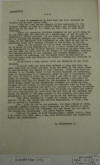
|
18. ca. May 21,
1932. Translation of
Manuel Ballardes M., Military
Encampment of General Juan
Gregorio Colindres, to General
Augusto C. Sandino, His
Encampment, p. 2.
" . . . Translation ¶ I want to
consecrate my last days and last
energies by helping you in your
great work. ¶ I had not come
before because it was necessary
for the traitor Moncada to give
us a motive (flag), and justify
us in that way in the eyes of
the world, in this step of such
transcendency. ¶ There are
enormous problems envolved
[involved] in our great work, we
do not come with the ambition of
a presidency. We are in back of
something a little greater. In
the first place: the country.
Let us fortify our brains,
sharpen our wits, and grease our
machine guns, to the encounter
with diplomacy or war, that we
may win an honorable peace or a
certain victory in the fields of
battle. ¶ Thus, it all depends
on you my dear General, if you
order me to march to your
encampment, or if I should await
you here in the encampment of
our brother General Colindres,
so that from here you may send
our last word to the people of
the occident, ordering the
reconcentration of our columns,
and prepare everything with your
talent and strategy, for the
march where we are sure of
shaking hands with our valiant
an beloved leaders and soldiers
of the occident. ¶ In my heart I
have strong faith and illusion
of our final triumph. ¶ I should
tell you that your triumph is
won, you have now made them feel
in North America, those who deal
in the human flesh of our
brothers, the import of your
mission. About five days ago
Colonel W. G. Sheard, Chief of
the Guardia National de
Nicaragua, came to Tegucigalpa
in a tri-motor plane to hold a
conference with me, that is what
he said, and to whom I saw fit
to give my statements in
writing. Through his manner and
speech I was given to understand
that all the blaim [blame] for
the disgrace of Nicaragua, and
their shame, falls on the
degenerate Moncada; and after my
conference and his return to
Nicaragua, we received word by
wire from Danlí that the
President had asked the consent
of Congress to retire. That is
too bad because we would like to
catch him alive and submit him
to a liquidation and take from
him all that he has stollen
[stolen] and repay the losses of
the poor people of the Segovia,
who have been slaughtered and
destroyed in the market of the
traitor Moncada. ¶ With great
emotion do I await the chance to
embrace our beloved Chief, his
worthy and valiant companions,
to whom I beg you to extend my
regards. ¶ How I long to see in
our caravan, the dear friend of
ours, Augustín Sanchez Salinas,
your Secretary, as the father of
this valiant young man was the
Secretary of, and loved by, the
man of his ideals and
sentiments: the great Maximo
Jerez. ¶ With my respects to
your distinguished Señora
(wife), whom I no doubt will
meet here, I am, your
affectionate and respectful
friend and subordinate. ¶ M.
Balladares M."
|
|
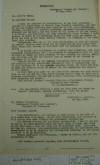
|
19. ca. May 23,
1932. Translation of Manuel
Ballardes, Encampment "Light and
Shadows," to Mr. Alberto Gámez.
"TRANSLATION ¶ Encampment
“Lights and Shadows”, 23 May,
1932. ¶ Mr. Alberto Gámez. ¶ My
esteemed friend: ¶ I have the
pleasure of participating to you
that yesterday I entered the
first camps of General Juan
Gregorio Colindres, and both he
and his valiant soldier have
received me with great
enthusiasm. General Colindres is
a perfect gentleman, pleasant
conversationalist, educated and
cultured, and well liked by the
tigers of his van guard. I am
writing you hurriedly, as, upon
despatching these letters, I
will prepare to match to the
mountains along the Coco river
and expect to be at the side of
our idol, General Sandino, the
fondling of the Americas, very
shortly. ¶ Undoubtedly very few
of the high politicians, as they
are called, in Central America,
have found out the magnitude of
this great movement, which will
shortly be converted into the
arbitrary of our grand deeds. ¶
I am filled with enthusiasm and
courage when confronted with
this wonderful organization, and
I am disposed to colabrorate
[collaborate] with it, that it
might be solid and well founded;
we will fortify our brains,
sharppen [sharpen] our wits, and
oil our machine guns in search
of our triumph in diplomacy or
in war. ¶ Upon my arrival at the
General Encampment where my
friends are now awaiting me the
Provisional Government will be
inaugurated, and we will
announce it to the spanish
[Spanish] speaking world, and
hoist our flag of blue and white
in which we enfold the the
conscience and dignity of our
people. ¶ We will very soon give
you the news which crosses our
path daily. This is how all men
who love their country should
feel; we seek not a degraded
presidency, nor selfish private
interests which unfortunately
have disgraced our people. ¶
With cordial personal regards
from your affectionate friend, ¶
Fatherland and Liberty, ¶ (s) M.
Balladares M., ¶ P.S. You can
publish anything I send you that
does not touch the “Machos”
(Marines), publish everything.
Move the press. ¶ TRANSLATION ¶
TEGUCIGALPA, HONDURAS, 28 May,
1932. ¶ Mr. Manuel Balladares, ¶
Encampment “Lights and Shadows”,
¶ Republic of Nicaragua. ¶ Most
Esteemed Manuel: ¶ I am
acknowledging the receipt of
your letter of the 23rd of this
month from this camp. As you
will understand, the contents of
this letter have done nothing
but profoundly surprise me. ¶
For obvious reasons not
requiring explanation, I beg of
you not to mix me in these
matters which you have taken in
hand, and which as you well know
I have not seen fit to interfere
with. This does not keep me,
however, from appreciating
personally the confidence you
demonstrate in me by trusting
the information contained in the
letter referred to in my
knowledge. ¶ Having expressed
the foregoing, I close by
wishing you all the protection
of God. ¶ With kindest personal
regards, your affectionate
friend,"
|
|
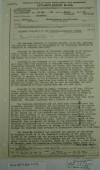
|
20. May 23, 1932.
Military Attaché, Tegucigalpa,
"Alleged Violation of the
Honduran-Nicaraguan Border,"
p.1.
"The Honduran Minister of
Foreign Affairs, on 18 May,
informed the American Minister
in Tegucigalpa of the following
incidents of violation of
Honduran Territory: ¶ Reported
by Commandant of Cifuentes,
Honduras, on 30 April,-- That a
patrol of the Guardia Nacional
de Nicaragua, forty in number,
under the American Marine,
Lieut. Jacob Keller, who gave
the excuse that they did not
know they had crossed the
border. ¶ Reported by the
Governor of the Department of
Colón, Honduras, on 9 May,--
That the residents of Mocarrón
complain that a body of
Nicaraguan Guardias have crossed
the border into Honduran
territory causing all kinds of
damages, such as destroying
property, stealing all movable
goods, and burning the
settlements of Saulala, Leymis,
San Gerónimo, Pranza, Sujil,
Suaven, Paloyumpa, Ulgras and
Voyraopanes. One of the victims
of the misdeeds committed by the
Guardia Nacional in numbers
varying from 23 to 25, regularly
commanded by two Yankee
officers, is the individual
Rafael Blanco, who was born and
reared in Leymis, from whom they
stole 40 head of cattle,
destroying his crops, and
forcing him to move to Mocarrón,
the rest of the residents of
those places have run the same
luck. ¶ Reported by the Judge of
Danlí, Honduras, on 17 May,
1932,-- That a report was
received from Escuapa that
Nicaraguan Guardia patrol
crossed the border and entered
the settlement of Nance of that
jurisdiction where they captured
Juan Pablo Bellorin, a
Nicaraguan who resides and is
registered in Danlí, whom they
later executed. Fernando
Quinteros was a witness to this
act. ¶ The Honduran Government
did not seem much concerned over
the Cifuentes incident realizing
the difficulty in locating the
border in that vicinity.
However, the Foreign Minister
stated it would probably be
necessary to despatch soldiers
to protect its nationals on the
border due to the Macarrón and
Nance incidents. It is believed
very doubtful if the Honduran
Government despatches soldiers
to the Macarron area as it is
located in the partially
explored, sparsely inhabited
mosquitia area. However, nothing
could be more favorable than the
placing of troops in the
Cifuentes--Nance area. Although
the reliability of the Honduran
soldiers is almost nil, it is
possible that the presence of
troops in the vicinity might
discourage the reported free
movement of Nicaraguan bandits
in this area. ¶ The Macarrón
incident was possibly the
outcome of the mutiny at
Kisalaya which is in the
immediate vicinity of the towns
mentioned in the report and the
pillaging was no doubt performed
by the guardias who deserted
from Kisalaya and not the action
of regular guardia properly
commanded. Nance is the name of
a farm south of Escuapa, near
the Nicaragua--Honduras border,
where this is a . . . ¶ (See
page two--- . . . "
|
|
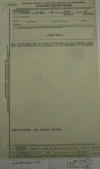
|
21. May 23, 1932.
Military Attaché, Tegucigalpa,
"Alleged Violation of the
Honduran-Nicaraguan Border,"
p. 2.
" . . . small settlement, and no
further information of the
incident, other than that
contained in the telegram to the
President, is available. ¶ COPY
FURNISHED: Sec. Brigade,
Managua."
|
|
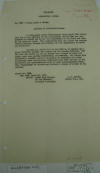
|
22. April 29,
1932. Major A. R. Harris,
Military Attaché, San José,
Costa Rica. "Activity of
Sandinista Forces."
"NICARAGUA ¶ POPULATION & SOCIAL
¶ No. 2700 – Public Order &
Safety. ¶ Activity of Sandinista
Forces. ¶ A telegraphic report
from Managua dated April 28th
states that due to the activity
of the Sandinistas, martial law
has been declared in Estelí and
in all the Departments of the
North and also on the Atlantic
Coast. This disposition does not
affect the regions between
Corinto, Managua and Granada,
nor the departments of Rivas and
Chontales. ¶ Sandino has stated
that on May 15th he is opening
up a grand offensive against the
Yankees and the Guardia
Nacional. For the last six
months all of his forces have
refused to stand and fight, even
when greatly outnumbering the
Guardia. His forces have
conducted a guerilla warfare
consisting of surprises and
raids. Immediately upon
encountering resistance they
have run away in all directions
and reconcentrated again at some
pre-designated point. This
“manifesto” of Sandino may
indicate a change of policy in
his methods. ¶ Report No. 1588,
¶ San José, April 29, 1932. ¶
Source: Cable from Managua to
“La Tribuna”. ¶ Personal
knowledge. ¶ A. R. Harris, ¶
Major, G.S., M.A.-"
|
|
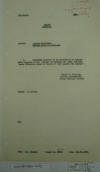
|
23. February 26,
1932. Captain Robert R.
Cummings, Acting Military
Attaché, Mexico City.
Translation of "Heavy Offensive
Attack of Sandino's Army Against
the Invader,"
La Prensa,
26 Feb. 1932, p. 1.
x"G-2
Report ¶ 3850: ¶ MEXICO ¶
POLITICAL ¶ SUBJECT: Foreign
Relations: ¶ Mexican Press on
Nicaragua. ¶ 1. Forwarded
herewith is translation of an
article which appeared in the
“Prensa” of February 26, 1932,
entitled “Heavy Offensive Attack
of Sandino’s Army Against the
Invader”. ¶ Robert E. Cummings,
¶ Captain, Infantry, DOL ¶
Acting Military Attaché ¶
Source: As stated. ¶ C/p ¶ From:
M.A. Mexico. ¶ Report No. 3803.
¶ Date: Feb. 26, 1932. . . . "
|
|
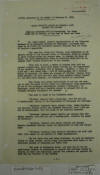
|
24. February 26,
1932. Captain Robert R.
Cummings, Acting Military
Attaché, Mexico City.
Translation of "Heavy Offensive
Attack of Sandino's Army Against
the Invader,"
La Prensa,
26 Feb. 1932, p. 2.
" . . . (Translation) ¶ Article
published in “La Prensa” of
February 26, 1932. ¶ HEAVY
OFFENSIVE ATTACK OF SANDINO’S
ARMY AGAINST THE INVADER ¶ Soon
all Nicaragua will be
Controlled, the Enemy Wiped out
by Gunfire, at the Cost of Blood
and Lives ¶ Dr. Pedro Zepeda,
general representative of the
“Ejercito Defensor de la
Soberanía Nacional de
Nicaragua”, delivered last night
to LA PRENSA the following
bulletin received from the field
of Sandino’s operations: ¶ “Our
Army has, since last October,
been developing an offensive
worthy of the national honor of
Nicaragua, which we propose to
carry through during the present
year, to prevent, by force of
right, the whole Machiavelian
[Machiavellian] farce of
elections which will be
attempted under foreign
supervision in our country. ¶
“With this in view, a number of
columns have left our general
headquarters, which will filter
through all the Departments of
our Republic, including that of
Managua. Likewise, a total of
1,600 men – our finest boys –
with 36 machine-guns and 6
hundredweight of dynamite, all
under the command of “brother”
General Francisco Estrada; and
with him will also fight
Generals Carlos Salgado P., and
Juan Pablo Umanzor, and Colonels
Padilla [unreadable] Altamirano.
¶ “Our forces will carry
instructions to add men and
arms, and to hold the enemy at
bay, while the undersigned takes
possession of one of the
principal departmental centres
(“cabeceras”) of Nicaragua,
which will be a decisive signal
to proceed with an enveloping
movement throughout the country.
¶ “Our army is ready in the
following order: ¶ “‘Brother’
General Pedro Altamirano, with
700 men and 9 machine-guns,
active in the Departments of
Matagalpa and Jinotega. ¶
“‘Brothers’ Generals Pedro
Antonio Irías, Simón González,
and Colonels Abraham Rivera and
Perfecto Chavarría, with 1,000
men and 10 machine-guns, face
the enemy on our Atlantic
seaboard. ¶ “‘Brothers’ General
Ismael Peralta and Colonel Díaz
Hernández Mayréna, with 300 men
and 4 machine-guns, threaten the
enemy in Chontales. ¶
“‘Brothers’ General Juan Santos
Morales and Colonel Ruperto
Hernández Roblero, cover the
Departments of León and
Chinandega. ¶ “‘Brothers’
Generals Juan Gregorio Colindres
and José León Díaz, will remain
in the service of these
headquarters. ¶ “On the Costa
Riva and Rivas frontiers, we
have as immediate chiefs of
those forces, heroic young
intellectuals, well known in the
political circles of Nicaragua
and Costa Rica. ¶ “Our army is
increasing daily, and each one
of our expeditionary leaders is
authorized to appoint new
military chiefs to operate in
their own localities against the
invaders and against the dogs
who are traitors to our
Country.- . . . "
|
|
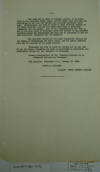
|
25. February 26,
1932. Captain Robert R.
Cummings, Acting Military
Attaché, Mexico City.
Translation of "Heavy Offensive
Attack of Sandino's Army Against
the Invader,"
La Prensa,
26 Feb. 1932, p. 3.
" . . . “Our army has no means
of issuing reports, so we leave
that to the deceitful enemy,
whose reports always tell how
they are caps. Nevertheless, our
army is about to take military
control of the whole Republic,
and yet the enemy still keep on
deceiving themselves and the
people. Part of the
responsibility for this is due
to the paid press of Nicaragua
which has brought on the
greatest confusion among the
Nicaraguans who will now be
surprised to see our army
victorious throughout all the
Republic. ¶ “Our military
operations will make themselves
felt, as did the taking of
Chichigalpa and other towns, and
the public observer will see the
fallacy of the enemy reports. ¶
“Nicaragua can only be freed by
bullets and at the cost of our
own blood; therefore our army is
determined to annihilate the
electionary forces and the
“hangmen” of Nicaragua. ¶
“General Headquarters of the
‘Ejercito Defensor de la
Soberanía Nacional de
Nicaragua’. ¶ “Las Segovias,
Nicaragua, C.A., January 16,
1932. ¶ “Patria y Libertad” ¶
(signed) “CESAR AUGUSTO
SANDINO”"
|
|
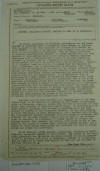
|
26. February 22,
1932. Naval Attaché,
Tegucigalpa. "Sandino,
Nicaraguan Bandit, Anxious to
Come to an Agreement," p. 1.
"On varied occasions, by
different individuals who the
Naval Attaché is convinced have
a connection either direct or
indirect with Sandino, it has
been suggested and assured that
Sandino is quite anxious to come
to an agreement and withdraw
from his activities in the
mountains of Nicaragua. Each of
these individuals on separate
occasions have assured the Naval
Attaché that the only solution
of this problem would be to
convene a Central American
conference with a representative
of each of the five republics,
attended by Sandino, and by a
delegate of the Government of
the United States, who would be
nothing more than an observer.
Sandino, it is alledged
[alleged], would be willing to
comply with the decision of such
a conference, and is even
desirous of obtaining such
terms, thus giving him
recognition, at least by the
Central American Governments, as
a political figure and an
ulterior motive for desisting
from further activities without
prejudicing his prestige with
his present following and
sympathizers. It is understood
that he would require a safe
conduct to attend the conference
which would be invalid on his
departure from the conference.
One of the above mentioned
individuals stated that it would
be necessary for President
Moncada to write a letter to
Sandino proposing this
conference. Another admitted
that he communicates with
Sandino and stated his
willingness to write a letter to
Sandino proposing said
conference provided the American
Legation approved. The Naval
Attaché discussed the matter
with the American Minister who
decided against making any such
proposal as it was in the nature
of a recognition of Sandino as
other than a bandit and outlaw.
¶ Reliable reports were received
that Sandino came to the farm
“Entre Rios” in the section of
Honduras on the border of
Nicaragua known as Cifuentes,
where he stayed from the 9th to
the 11th of this month, then
returned to Nicaragua via El
Limon. An investigation of these
reports indicates that he came
to Honduras as he was hard
pressed by patrols of the
Nicaraguan Guardia, and was half
decided to leave Nicaragua, at
least temporarily, for a sojourn
into Mexico. The investigation
further indicated that his
return to Nicaragua was effected
for two main reasons: first,
that in view of the disturbances
in Salvador, he considered it
highly unsafe to attempt his
passage through that country;
and second, that while he was in
Honduras he was joined by Arturo
Vega, Augustin Sanchez Salinas,
and a number of other strong
Sandinistas who convinced him
that he should return and resume
his activities. ¶ On 23
February, Ramón Guillen,
Nicaraguan, residing in Danlí,
Honduras, presented himself in
this office. The object of
Guillen’s visit presumably was
to inform the Naval Attaché of
his willingness to aid in
settling conditions in
Nicaragua, however it is
believed that he might be an
envoy from Sandino to feel out
the attitude of the U.S.
Government. ¶ (See Page
Two--------- . . . "
|
|
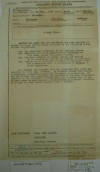
|
27. February 22,
1932. Naval Attaché,
Tegucigalpa. "Sandino,
Nicaraguan Bandit, Anxious to
Come to an Agreement," p. 2.
" . . . Guillen was asked what
he considered the best solution
to pacify Nicaragua and his
reply consisted of the following
rather radical suggestions: ¶
1st. The immediate withdrawal of
all American forces. ¶ 2nd.
Elections not to be supervised
by Americans but held under
purely Nicaraguan control. ¶
3rd. President Moncada to resign
turning the control of the
Government over to the Council
of Ministers. ¶ 4th. Sandino to
be permitted to remain in
Nicaraguan without molestation
only to be required to promise
to cease operations. ¶ Mr.
Guillen was informed that his
proposals were quite impossible
to carry out. However, if he
could obtain from Sandino a
reasonable proposal he might aid
in coming to a solution. He was
enlightened too, regarding the
position of the U.S. Government
relative to the President of
Nicaragua, and informed that it
was without power to ever
request a constitutionally
elected President to resign and
would never consider such a
measure. ¶ COPY FURNISHED: Hqtrs
USMC Opr&Tr. ¶ COMSPERON ¶ Sec.
Brig. Managua"
|
|
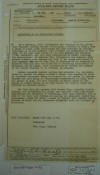
|
28. February 17,
1932. Naval Attaché,
Tegucigalpa. "Activities of the
Nicaraguan Bandits."
"On 4 February, 1932,
information was obtained to the
effect that Augustín Sanchez
Salinas (Nicaraguan, resident of
León), with a group of eight
other Nicaraguans had been
arrested in Paraíso, Honduras,
as it was alledged [alleged]
they attacked the Comandante of
that town, at the same time
firing at him with pistols and
shouting “Viva, Sandino!”, and
they were concentrated at Danlí,
Honduras, for observation. On
February 9th, information was
received from several sources
that Sanchez and most of the
group left Danlí to join
Sandino, who was at that time in
Honduras in the vicinity of
Malacate Mountain with the
intention of returning
immediately to Nicaragua via El
Limon. This information re
Sandino was radioed to the
Second Brigade, U. S. Marines,
in Managua. ¶ Before Augustín
Sanchez Salinas was arrested,
Dr. Alejandro Cerda G., showed
the Naval Attaché a letter from
Sanchez in which he (Sanchez)
requested Cerda to arrange for
his return to Sandino. Sanchez
and this group of Nicaraguans
concentrated at Danlí were not
placed in jail, but were
required to report daily to the
police in Danlí, making it an
easy manner for them to leave
the vicinity as reported above.
¶ The fact that, the reports
that Arturo Vega, Augustin
Sanchez Salinas, the
aforementioned group, and
numerous other Nicaraguan
Sandinistas are returning to
Nicaragua, have been verified,
and in view of the fact that
Sandino is sending out extensive
recruiting propaganda, leads the
Naval Attaché to believe that
Sandino really intends to carry
out his announced offensive into
the interior of Nicaragua. ¶
COPY FURNISHED: Hqtrs USMC Opr.
& Tr. ¶ Comsperon ¶ Sec. Brig.
Managua"
|
|
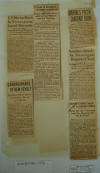
|
29. Feb.-March
1932. Press Clippings.
"U.S. Marine Hurt in Nicaraguan
Guard Skirmish," Feb. 4, A.P.
"Marines Push Sandino Drive,"
Feb. 11, 1932. "Sandino
Attack in Nicaragaua Reported
Near," Feb. 26. "Sandino
Warns of New Revolt,"
Pittsburgh Press, Feb. 27.
"Reports Town Taken By A Sandino
Force," Feb. 27. "12 Slain
in Nicaragua in Three
Skirmishes," New York Times,
March 16, 1932.
"U.S. Marine Hurt In
Nicaraguan Guard Skirmish ¶
Sergeant Brannon Wounded, 2 of
National Guard Killed in Clash
With Sandinista ¶ By
The Associated Press ¶ MANAGUA,
Nicaragua, Feb. 3.—Two members
of the National Guard were
killed and a United States
marine was wounded slightly in
the course of skirmishes near
Matagalpa City yesterday and on
Monday, it became known today.
The clashes occurred on the Tuma
River and involved a National
Guard patrol of forty-eight men
under a Marine first sergeant,
C. T. Brannon, of Atlanta, an
acting lieutenant, and Second
Lieutenant M. A. Cramer, of
Marmarth, N. D. A group of
Sandino’s followers was
encountered and left four of
their dead and two of their
wounded at the scene of the
encounter. ¶ National Guard
headquarters reported that the
patrol made contact with a group
of 100 Sandinista, fighting for
two and a half hours before the
enemy retreated. There was
another skirmish of thirty
minutes in the afternoon, after
which the Sandinistas were
dispersed. Sergeant Brannon’s
wound, in the face, was
superficial. There was evidence
that the Sandinistas had
suffered other casualties at the
scene. ¶ SANDINO WARNS
OF NEW REVOLT ¶ Nicaraguan Tells
of Recruiting Forces to War on
U. S. Marines ¶ By The
United Press ¶ MEXICO CITY, Feb.
26—Plans for an extensive drive
against the government of
Nicaragua and United States
forces in that country to
prevent the presidential
elections in November were
announced today by “Colonel”
Agustino C. Sandino, Nicaraguan
insurrectionist through his
foreign agent Dr. Jose Zepeda. ¶
Sandino’s statement dated
“Headquarters Las Segovias,
Nicaragua, January 16” announced
preparations had been proceeding
since last October to prevent
the “Machiavelian
[Machiavellian] election farce
which it is proposed to enact
(in Nicaragua) under foreign
supervision.” ¶ The statement
adds that armed groups have been
dispatched to the principal
provinces, supplied with arms
and dynamite, to recruit more
men. ¶ 12 SLAIN IN
NICARAGUA IN THREE SKIRMISHES ¶
National Guard Suffers No
Casualties in Clashes With
Insurgents Over Three Days.
¶ By Tropical Radio. ¶
MANAGUA, March 15.—Nicarague
[Nicaragua] National Guard
headquarters report that eight
insurgents were killed in a
sharp skirmish recently near San
Benito. There were no guard
casualties. ¶ The insurgent
bandit camp was destroyed and
considerable supplies and
ammunition were captured. Donald
Truesdale of the United States
Marines and a Lieutenant in the
National Guard, commanded the
patrol. ¶ Special to THE
NEW YORK TIMES. ¶
WASHINGTON, March 15.—Increasing
insurgent activities in
Nicaragua were indicated in
dispatches to the Navy
Department today. Three contacts
in three days, in which twelve
insurgents were killed and many
more wounded were reported from
Marine headquarters at Managua.
In all instances the battles
were with detachments of the
Nicaraguan National Guard
operating under command of the
United States Marines. ¶ The
first engagement was last
Friday, when a detail of the
guard under Lieutenant Donald
Leroy Truesdale fought a battle
in the Province of Nueva Segovia
with a band under commander of
the Chieftain Toreyes. Eight
insurgents were killed and an
unknown number wounded. ¶ The
following day a guard patrol had
a running fight with insurgents
near the Honduran border. The
bandits were chased into
Honduras. Casualties were not
given in the dispatch to the
department. ¶ On Sunday in the
third contact in the Province of
Leon four insurgents were killed
and several wounded. There were
no guard casualties in any
engagement. ¶ On Feb. 4 Captain
Arthur C. Small and a guard
patrol from Yali, in the north
of Jinotega Province, had
contact at El Tule with a group
of about twenty-five insurgents,
whose leader was not identified.
One rebel was killed and one
wounded. ¶ MARINES PUSH
SANDINO DRIVE ¶ COLON,
Panama, Feb. 10 (U.S.).—Eighty
are reported dead following an
outbreak of fighting in
Nicaragua between guerrilla
troops headed by Augusto Sandino
and government soldiers aided by
United States Marines. ¶ Reports
from Bluefields, Nicaragua,
stated the national guard has
started a drive to clear the
country of bandits. ¶ Sandino
personally is leading the
anti-government drive while
Marines at the head of native
troops are covering the entire
seaboard. ¶ Sandino
Attack In Nicaragua Reported
Near ¶ Spokesman Says Rebel
Leader Has Army of 2,600Men
[2,600 Men] Ready to Attack
Managua ¶ By The
Associated Press ¶ MEXICO CITY,
Feb. 25.—Dr. Pedro Jose Zepeda,
foreign representative of
General Augustino Sandino,
Nicaraguan rebel leader, made
public here today a statement
which he said came from Sandino,
in which the latter announced
that he had built up his army to
2,600 men, equipped with
thirty-six machine guns, plenty
of rifles and ammunition, and
that he was now ready to start a
drive on Managua, Nicaraguan
capital. Most of the troops are
in the northern provinces, the
statement said. It also quoted
Sandino as saying: ¶ “Nicaragua
will be freed only with bullets
and at the cost of our lives,
and for that reason our army
proposes to end the farcical
elections and drive out the
hangmen in control of the
country.” ¶ REPORTS TOWN
TAKEN BY A SANDINO FORCE ¶
Mexico City Aide of Nicaraguan
Leader Says Chinandega Will Next
Be Stormed. ¶ MEXICO
CITY, Feb. 26 (AP).—Dr. Pedro
José Zepeda, foreign
representative of General
Augustino Sandino, the
Nicaraguan insurgent leader,
said today a force of
Sandinistas under General
Francisco Estrada had taken
possession of Bella Vista,
fifteen miles from Chinandega,
Nicaragua. ¶ He said they were
prepared to storm the Chinandega
garrison, which has been
reinforced by troops in command
of Captain T. R. Humblen, an
American, and that other
Sandinistas had captured Sauce
and Villanueva. ¶ Dr. Zepeda
also asserted President J. M.
Moncada of Nicaragua had
declared a state of siege in the
States of Chinandega and Leon,
and that complete censorship
over telegraph and telephone in
these provinces has been
applied. ¶ The representative
declared that at a time when the
whole world was sympathizing
with China for her defense
against Japan it was time for
the United States to “clean her
record” on the American
Continent by ceasing
“imperialistic activities” in
Nicaragua, where a withdrawal of
United States Marines would be
in keeping with the ideals
expressed by the State
Department in the Chinese
situation."
|
|
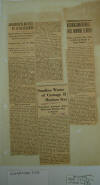
|
30. March-April
1932. Press Clippings.
"250 Bandits Routed by 18
Guardsmen,"
New York Times,
March 10, 1932.
"Nicaraguan Rebels Kill Marine
Leader," April 8, 1932.
"Sandino Warns of Carnage If
Marines Stay,"
Boston
Transcript, April 13, 1932.
"250 BANDITS ROUTED BY 18
GUARDSMEN ¶ Marine Officer in
Command of Nicaraguan Patrol Had
Mule Shot From Under Him. ¶
FOUGHT WAY OUT OF TRAP ¶ Bandits
Lost 8 Killed and Many Were
Wounded—One Guardsman Killed and
Three Hurt. ¶ Special
Correspondence, THE NEW YORK
TIMES. ¶ MANAGUA, March 9.—An
idea of the difficulties and
dangers encountered by American
officers serving with the
Nicaraguan National Guard is
given in a report submitted
today by Second Lieutenant C. H.
Clark of the United States
Marines, attached to the
Nicaraguan forces of an
engagement between his men and
bandits near El Sauce, in the
northern part of the country. ¶
One guardsman was killed and
three wounded, while the bandits
lost eight killed and many more
wounded[.] Two dynamite bombs,
together with two rifles and
ammunition, were captured.
Lieutenant Clark left Villa
Nueva with seventeen men Feb.
24, bound for Limay, via
Achuapa. He picked up a native
guide at Los Pinos. The party
left Caracol at noon. ¶ “Fifteen
hundred yards further on we were
ambushed at a place called Posa
Honda,” the report says. “The
contact lasted two hours and the
group was estimated at 250. It
was thought to contain
Colindres, Salgado and Umanzor.
The bandits employed four
automatic weapons and were very
aggressive. The patrol was
immediately surrounded, the
bandits closing in until they
were only about fifty yards from
the creek banks, throwing bombs
down on the patrol.[”] ¶
Officer’s Mule Killed.
¶ “When my point entered the
creek I was eight men back from
the first man and could not see
what kind of a place we were
entering. My men were some five
or ten yards apart. When I came
into the creek bed, the first
man was nearly through the
ambush which was laid in and
from both sides of the creek,
the high banks making it
impossible for my men to see
more than twenty feet on either
side and the big rocks in front
affording perfect hiding and
protection for the bandits. ¶
“As I came out into the creek
the bandits opened fire on me
with a Lewis, killing my mule.
Immediately the cargo mule
behind broke loose from the
mulero. Returning down the trail
I called to the men in front to
take the left bank, my idea
being to try and hold the
bandits off until I could get an
idea of the position.” ¶ The
bandits were closing in. Two of
the National Guardsmen were
wounded at the first fire. A
bomb knocked Lieutenant Clark
down but one of his men drenched
his face with water and helped
him back to cover. Thinking it
impossible to hold the position,
Lieutenant Clark signaled his
men to follow him up the right
bank of the creek in the face of
what he thought was the main
group of the enemy. There was
hand-to-hand fighting until they
got to the top of the hill where
Lieutenant Clark left five men
with his wounded and started
down the ridge with the rest of
his force to look for a missing
man. The bandits were running in
every direction. Two of them
were killed as they sought to
get the pack off the dead mule.
Two more guardsmen were wounded
as they returned to the hill
crest. ¶ Dead Man Left
Behind. ¶ After
bandaging the wounded,
Lieutenant Clark again started
down the hill with six men. The
bandits fled as they reached the
creek. The body of a dead
guardsman was found, his shoes,
rifles and belt missing.
Stretchers were made for the
wounded and the party started
for Achuapa. The guide had been
killed so Lieutenant Clark
followed the creek northward.
The dead man proved too much of
a burden and his body was hidden
back of the trail and two trees
were marked with a cross to
indicate the position. The party
had to travel slowly and reached
Achuapa at 10:30 that night. ¶
“I recommend the entire patrol
for citation, and especially
note and recommend the conduct
of Cabo Panfilo Mendez,” the
report concludes. “After being
dazed and nearly killed, he
fought bravely, begging to
accompany me down the hill. I
also want to recommend the
conduct Raso Iginio Romero, Raso
Manuel Gomez and Raso Velasquez
Apolonio. These men, while
wounded, continued to fight
without any thought of self or
of asking for aid and took the
entire trip without complaining.
In fact, the conduct of the
entire patrol was such that no
words can repay them for the way
they conducted themselves.” ¶
Sandino Warns of Carnage
If Marines Stay ¶ Nicaraguan
Insurgent Makes Blood and
Thunder Plea to Parents
¶ Mexico City, April 12
(A.P.)—An appeal to the American
parents of marines serving in
Nicaragua to demand withdrawal
of their sons before the
“ghastly and useless carnage” of
the approaching November
elections, has been made by
General Augustino Sandino,
Nicaraguan insurgent leader, in
an open letter to President
Hoover and the American people.
The letter was released here
today by Dr. Pedro Jose Zepeda,
General Sandino’s foreign
representative, as final plans
for the observance of Pan
American day Thursday were
completed. ¶ “Many of your sons
will not be aboard the American
battleships leaving Nicaragua in
November when the United States
withdraws its fighting forces,”
Sandino wrote. “These sons of
American parents will not be
going home. They will lie in
their coffins, or, worse still,
their bodies will rot in
Nicaraguan jungles. Patriotic
Nicaraguans will recognize no
Government imposed by American
marines. The winners will not be
recognized, the Government will
be overthrown and chaos will
result. ¶ “I will disband my
troops if the marines withdraw
now, but otherwise a
post-election revolution is a
certainty. Nicaraguans seek only
the privilege of following out
their own destiny. It is our
country and we wish to keep it
so.” ¶ NICARAGUAN REBELS
KILL MARINE LEADER ¶ Sergt.
Levonski, New York, Is Victim of
Mutiny in Guard Outpost.
¶ Bluefields, Nicaragua, April 7
(A.P.). Sergt. Charles J.
Levonski, U. S. Marine Corps, of
New York, a lieutenant in the
guardia nacional of Nicaragua,
was killed early yesterday in a
mutiny led by discontented
native sergeants at Kisalaya, a
guardia outpost at which he was
in command. ¶ His lieutenant,
Carlos Reyes, a Nicaraguan, was
wounded. ¶ The remoteness of the
outpost is believed to have
inspired the natives to start
the mutiny. Kisalaya is located
on the Wanks River. Twenty-five
men were stationed there with
the two officers. ¶ After the
officers had been attacked ten
loyal guards joined the nearest
garrison, while fifteen fully
armed men went up the river for
Jinotega. ¶ Col. Lloyd L. Leech,
of Virginia, commander of the
Atlantic Coast, is bending every
effort with airplane
reconnaisance [reconnaissance]
and patrol ground work to
capture the mutineers. ¶
Levonski had been in Nicaragua
for more than four years and had
an excellent record for
gallantry in the war with the
Segovias. ¶ He was considered
popular with the native soldiers
and was rated as one of the most
efficient officers in the
republic. ¶ (Associated
Press.) ¶ The death of
Sergt. Levonski was reported to
the Navy Department yesterday by
Lieut. Col. Calvin B. Matthews,
commanding the Nicaraguan
national guard detachment. ¶
Col. Matthews reported that
Levonski’s body had not yet been
recovered. One sergeant and
fourteen enlisted guardia of the
command had deserted from he
[the] post at Kisalaya. ¶
Levonski was born in Warsaw,
Poland, November 2, 1903. He had
continuous Marine service since
he first enlisted April 21,
1923. He participated in
approximately 25 engagements
with insurgents since he went to
Nicaragua in January, 1928. His
father, Alexander Levonski,
lives at Dolgeville, N. Y."
|
|
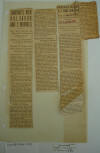
|
31. April 1932.
Press Clippings.
"Sandino's Men Kill Sailor and 2
Marines,"
New York Herald
Tribune, April 23, 1932.
"Well Known At Annapolis" and
"Fight Follows Sandino's Warning
To Hoover,"
Baltimore Sun,
24 April 1932. "Nicaragua
Causing U.S. Some Concern,"
Baltimore Sun, April 24,
1932.
"SANDINO’S MEN KILL
SAILOR AND 2 MARINES ¶ Trio Were
Serving As Officers Of
Nicaraguan National Guard ¶
LIEUT. L. C. BRUNTON IS AMONG
VICTIMS ¶ Married To Former
Baltimore Girl On Annapolis
Graduation Day ¶ [N.Y.
Herald Tribune Copyright, 1932]
¶ Managua, Nicaragua, April 22
(By Wireless)—A second
lieutenant and a corporal of the
United States Marine Corps and a
petty officer of the United
States Navy were killed
yesterday in a hot four-hour
battle with Nicaraguan
insurgents owing allegiance to
Gen. Augustina Sandino. ¶ Eight
soldiers of the Nicaraguan
Guardia Nacional were killed and
three wounded, and the
Sandinistas’ losses were
reported to have been heavy. ¶
List Of American Dead
¶ The dead: ¶ SECOND
LIEUTENANT LAWRENCE C. BRUNTON,
U. S. M. C. (Guardia first
lieutenant); next of kin, wife,
Mrs. Alice M. Brunton, San
Diego, Cal. ¶ CORPORAL LAURIE T.
COVINGTON, U. S. M. C. (Guardia
first lieutenant); next of kin,
mother, Mrs. Clara Covington,
Spartanburg, S. C. ¶ FINIS H.
WHITEHEAD, U. S. N.,
pharmacist’s mate, first class
(Guardia second lieutenant);
next of kin, mother, Mrs. Nancy
C. Whitehead, Grosse Point,
Mich. ¶ The bodies of the
Americans were brought from the
battlefield by airplane and
interred this afternoon at
Managua in the new general
cemetery. The funeral cortege
was accompanied by the marine
officers and enlisted men
stationed in the capital. ¶
Rebels Finally Repulsed ¶ The
encounter, which ended several
months of comparative quiet in
the northern sector of the
country, included three contacts
between about 200 Sandinistas,
whose leaders’ names are not
known, and Guardia patrols
numbering about fifty men,
commanded by the Americans, at
Point Las Puertas, near Apali,
some thirty miles northeast of
Ocotal. ¶ The fighting lasted
from 11.30 A. M. to 3.30 P. M.
The rebels finally were hurried
back by a patrol under Guardia
Capt. Chandler W. Johnson, U. S.
M. C. first lieutenant, which
drove them easterly toward San
Fernando. ¶ Well Known
At Annapolis ¶
[Annapolis Bureau of The Sun] ¶
Annapolis, April 22—Lieut.
Lawrence C. Brunton, U. S. M.
C., who was killed yesterday in
a brush with insurgents in
Nicaragua, was well known in
Annapolis. ¶ He was graduated
from the United States Naval
Academy in June, 1930, and on
graduation day married Miss
Alice May Bender, an Annapolis
girl, formerly of Baltimore, in
St. Mary’s Church here. Mrs.
Brunton is living with her
stepparents at Mountain View,
Cal., at present. ¶ Following
his graduation, Lieutenant
Brunton spent nine months in
Philadelphia on duty and was
then transferred to California.
About a month ago he was sent to
Nicaragua for a two-year tour of
duty. ¶ Fight Follows
Sandino’s Warning to Hoover
¶ Mexico City, April 22 (AP)—Dr.
Pedro Jose Zepeda, foreign agent
for Gen. Augustino Sandino,
Nicaraguan rebel, said today
that the battle in which three
Americans lost their lives with
a drive to commemorate the
killing on May 5, 1931, of Gen.
Miguel Angel Ortez, one of the
principal Sandino lieutenants. ¶
Dr. Zepeda asserted he had this
information from General Sandino
himself. Ten days ago the
Nicaraguan insurgent addressed
an open letter to President
Hoover in which he declared that
unless the United States wanted
to leave many Americans dead on
Nicaraguan battlefields the
marines should be withdrawn
forthwith. ¶ Says Hoover
Ignored Warning ¶ Word
that this warning to the
President had been ignored has
come to him, Dr. Zepeda said,
from General Sandino, who again
called on the marines to
withdraw because “it is useless
for them to remain to sponsor
elections, as candidates elected
in marine-supervised elections
would be overthrown without
delay and chased from the
country.” ¶ The foreign agent
quoted General Sandino as saying
that he would continue his drive
around Ocotal, in the vicinity
of his mountain headquarters,
and that yesterday’s battle was
a mere skirmish compared with
what was to come. ¶
NICARAGUA CAUSING U. S. SOME
CONCERN ¶ Killing Of More
Marines Reveals Complicated
Political Situation ¶ TROOPS TO
LEAVE JAN. 1 ¶ State Department
Determined To Withdraw
Forces—Moncada Wants Them To
Stay ¶ [Washington
Bureau of The Sun] ¶ Washington,
April 23—The killing of two
American marines and one navy
petty officer in Nicaragua on
Thursday has increased the State
Department’s determination to
withdraw all American forces by
January 1, 1933, but at the same
time has revealed a complicated
political situation which causes
real concern in the State
Department. ¶ Despite nearly
four years of Marine Corps
occupation, insurgent attacks in
Nicaragua have not abated, but
on the contrary the past twelve
months has seen a growing number
of them. During the past year,
fifteen marines lost their lives
in Nicaragua, according to
Maj.-Gen. Ben H. Fuller,
commandant of the Marine Corps.
They are exclusive of the three
men killed this week, and also
exclusive of the large number of
native Guardia killed by
insurgents. A total of 116
skirmishes were listed by
General Fuller for the past
year. ¶ Wants U. S.
Troops To Stay ¶
Although the State and Navy
Departments have described the
insurgents as “bandits” and
“Communists,” President Moncada
has said they were led by
General Sandino and his
henchman, General Colinores
[Colindres]. Because of the
numerous attacks President
Moncada has been anxious to
retain the marines in Nicaragua
beyond January 1, despite the
fact that their presence blocks
his plan to succeed himself in
office, in contradiction to the
Nicaraguan constitution. ¶ In
addition to the opposition to
General Sandino, President
Moncada is opposed by factions
within his own Liberal party,
one headed by Juan B. Sacasa,
leader of the 1926 revolution
which finally put Moncada in the
Presidency, and also by a Dr.
Arguello. Because of his
activity for the Presidential
nomination, President Moncada
has forced Dr. Sacasa to resign
as Nicaraguan Minister here. ¶
Moncada Sent Delegation
¶ In order to secure a
revision of the constitution
allowing him to remain in
office, President Moncada sent a
delegation to Washington headed
by Carlos Morales. Senor Morales
remained here more than a month
and held vari- […] in charge of
Latin-American […] endeavoring
to persuade him to […] Moncada’s
point of view. […] Senor Morales
was assisted […] Louis Manuel
Debayle, […] charge d’affaires
and former […] in Baltimore. ¶
Mr. White, however, […] adamant
and sent President […] a note
bluntly refusing his […]
following which Senor Morales
[…] to Nicaragua. ¶ The incident
was not without […] numerous
aftermaths, for shortly […] his
return, Nicaraguan newspapers
published interviews with […]
Morales, in which he placed the
[…] for his failure to
Washington […] shoulders of Dr.
Debayle. The […] he said, had
not created the […] atmosphere
for his visit and had […] him
look ridiculous in the eyes […]
world. ¶ What had happened was a
. . . "
|
|

|
32. April 24,
1932. "Nicaragua Causing
U.S. Some Concern" and "Lewis
Says Marines Save Investments of
Bankers,"
Baltimore Sun.
"NICARAGUA CAUSING U. S.
SOME CONCERN ¶ Killing Of More
Marines Reveals Complicated
Political Situation ¶ TROOPS TO
LEAVE JAN. 1 ¶ State Department
Determined To Withdraw
Forces—Moncada Wants Them To
Stay ¶ [Washington
Bureau of The Sun] ¶ Washington,
April 23—The killing of two
American marines and one navy
petty officer in Nicaragua on
Thursday has increased the State
Department’s determination to
withdraw all American forces by
January 1, 1933, but at the same
time has revealed a complicated
political situation which causes
real concern in the State
Department. ¶ Despite nearly
four years of Marine Corps
occupation, insurgent attacks in
Nicaragua have not abated, but
on the contrary the past twelve
months has seen a growing number
of them. During the past year,
fifteen marines lost their lives
in Nicaragua, according to
Maj.-Gen. Ben H. Fuller,
commandant of the Marine Corps.
They are exclusive of the three
men killed this week, and also
exclusive of the large number of
native Guardia killed by
insurgents. A total of 116
skirmishes were listed by
General Fuller for the past
year. ¶ Wants U. S.
Troops To Stay ¶
Although the State and Navy
Departments have described the
insurgents as “bandits” and
“Communists,” President Moncada
has said they were led by
General Sandino and his
henchman, General Colinores
[Colindres]. Because of the
numerous attacks President
Moncada has been anxious to
retain the marines in Nicaragua
beyond January 1, despite the
fact that their presence blocks
his plan to succeed himself in
office, in contradiction to the
Nicaraguan constitution. ¶ In
addition to the opposition to
General Sandino, President
Moncada is opposed by factions
within his own Liberal party,
one headed by Juan B. Sacasa,
leader of the 1926 revolution
which finally put Moncada in the
Presidency, and also by a Dr.
Arguello. Because of his
activity for the Presidential
nomination, President Moncada
has forced Dr. Sacasa to resign
as Nicaraguan Minister here. ¶
Moncada Sent Delegation
¶ In order to secure a revision
of the constitution allowing him
to remain in office, President
Moncada sent a delegation to
Washington headed by Carlos
Morales. Senor Morales remained
here more than a month and held
vari- […] in charge of
Latin-American affairs,
endeavoring to persuade him to
President Moncada’s point of
view. In this, Senor Morales was
assisted by Dr. Louis Manuel
Debayle, Nicaraguan charge
d’affaires and former Consul in
Baltimore. ¶ Mr. White, however,
remained adamant and sent
President Moncada a note bluntly
refusing his request, following
which Senor Morales returned to
Nicaragua. ¶ The incident was
not without its numerous
aftermaths, for shortly after
his return, Nicaraguan
newspapers published interviews
with Senor Morales, in which he
placed the blame for his failure
in Washington on the shoulders
of Dr. Debayle. The latter, he
said, had not created the proper
atmosphere for his visit and had
made him look ridiculous in the
eyes of the world. ¶ What had
happened was a series of
newspaper stories about the
trials and tribulations of Senor
Morales, who weighed well over
200 pounds, and who fell down on
the ice in the heart of the
capital’s shopping district,
according to local newspapers.
He was helped to his feet only
by the assistance of four men. ¶
Washington newspapers also
carried the story of how Senor
Morales had arrived in the city
in December wearing a white
tropical suit and had bought so
many green silk pajamas at a
local department store that that
establishment detailed one of
its employes [employees] to
accompany him wherever he went
around the city to guide him in
other purchases. ¶ 85 Cents For
Two Bananas ¶ Another story
featured in the local press was
Senor Morales’ discovery that
two bananas at a well-known
capital hotel cost 85 cents and
his protest that he could buy a
whole bunch in Nicaragua for
that price. ¶ The climax came,
however, when Senor Morales
discovered his photograph
published in a Washington
newspaper. He had taken great
precautions that his photograph
be not made public and he knew
that only two people in the
capital had it. One was Dr.
Debayle, and the other was Dr.
Leo S. Rowe, director of the
Pan-American Union. ¶ All of
this, Senor Morales claimed in
his interview given to
Nicaraguan papers, did not
create the proper atmosphere for
his negotiations and for the
continuation in office of
President Moncada. ¶ 2
Members of Guard Killed
¶ Managua, Nicaragua, April 23
(AP)—Insurgents killed two
members of the Nicaraguan
National Guard Thursday morning
in an attack on the east coast
garrison at Kisalaya, it was
learned today. The defenders
repulsed the attack. ¶
Lewis Says Marines Save
Investments Of Bankers
¶ Washington, April 23 (AP)—The
crack of rifles in Nicaraguan
jungles reverberated in the
Senate today with a charge by J.
Hamilton Lewis, of Illinois,
that American marines had been
“murdered” there after being
sent to protect the “investments
of private bankers.” ¶ Demanding
the withdrawal of the marines,
the Illinois Democrat said that
“all we get from our Government”
about the affair is that those
killed were repelling the
assaults of “insurgents.” He
added that the “insurgents” felt
they were repelling an invasion
of their country. ¶ “The lives
of our young men have been used
as pledges for the investments
of private bankers,” Lewis
asserted. “There is no
justification for sending our
soldiers there.” ¶ The marines
were being kept in Nicaragua to
support the present
administration, Lewis charged,
because it is under some “pledge
to pay these debts to private
American bankers.” ¶ As a result
of the course pursued by the
United States, Lewis said, this
country has no friends in
Central and South America."
|
|
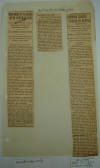
|
33. April 1932.
Press Clippings. "Marines in
Clashes with Nicaraguans,"
New York Times, April 26,
1932. "Insurgents Increase
Activities in Nicaragua," A.P.,
April 29, 1932. "Sandino
Leader Killed in Battle -
Florencio Silva, Chief Aide of
Nicaraguan Insurgent Chief,
Falls in Clash - Rebel Force is
Routed,"
Baltimore Sun,
April 30, 1932.
"MARINES IN CLASHES WITH
NICARAGUANS ¶ Three Guard
Patrols, Led by Americans, Kill
Four and Wound Seven Outlaws. ¶
100 RAIDERS HUNTED DOWN ¶ Troops
Recapture Belongings of Two
Slain Non-Commissioned
Officers—Mutiny Leader Dead.
¶ Special Cable to THE NEW YORK
TIMES. ¶ MANAGUA, Nicaragua
April 25.—A Nicaraguan National
Guard patrol of forty soldiers
under Gunnery Sergeant John
Hamas, of Philadelphia, Sergeant
John A. Burns of Burgaw, N. C.,
Corporal David H. Wallace of
Caddo, La., and Louis Emilio
Guetierrez of Ocotal pursuing
band which had attacked and
killed three United States
Marine Corps non-commissioned
officers near Apali serving with
the guard battled with a group
of 100 outlaws yesterday near
the Guambuco mountains. ¶ The
outlaws, led by Carlos Salgado
and Fulgencio Hernandez,
employed rifles, automatic
weapons and bombs, were routed
by the guards in a sharp
skirmish. The outlaw casualties
were two dead and seven wounded
and the only guard casualty was
Frolian Garcia, a Nicaraguan,
who was severely wounded. ¶
Arms, ammunition, dynamite,
bombs and supplies were
captured. Among the articles
taken from the outlaws were a
blanket belonging to Corporal
Covington and puttees of
pharmacist’s Whitehead. ¶ The
National Guard then made camp
for the night. The outlaws
concentrated and attacked the
Guard camp twice last night but
were driven off. ¶ Sergeant
Hamas, in reporting the clash,
praised the fine services
Sergeant Burns and Gutierrez for
their leadership and untiring
energy throughout the
engagement. ¶ Captain Edward L.
Burwell, United States Marine
Corps, at Ocotal reported that
two National Guard patrols made
two contacts with outlaws in
that vicinity yesterday. ¶
National Guard headquarters
reports that former Sergeant
Sebastian Jimenez, leader of
some deserters from Kisalaya
Garrison on the East Coast when
First Lieutenant Charles J.
Levonski of the Marine Corps was
killed, joined the outlaws,
receiving the rank of Colonel. A
few days ago, with thirty
outlaws Jimenez attacked the
Guard camp he had deserted. In a
sharp encounter Jimenez and
another mutineer were killed. ¶
Insurgents Increase
Activities In Nicaragua
¶ Managua, April 28 (AP)—The
Nicaraguan Congress today
declared a state of war in the
department of Esteli and in the
areas about the most important
towns of Northern Leon and
Chinandega departments. A state
of siege was declared also in
the eastern coast departments
and the northern area
departments. ¶ The Congressional
decree was a result of renewed
activities by insurgents in
recent weeks. The areas affected
do not include the regions
served by the railroads from
Corinto to Managua and Granada,
nor the departments of Rivas and
Chontales. ¶ Several United
States marines serving as
officers of the Nicaraguan
National Guard, and a number of
enlisted guardsmen have been
killed or injured recently in
skirmishes with insurgent
forces. ¶ SANDINO LEADER
KILLED IN BATTLE ¶ Florencio
Silva, Chief Aide Of Nicaraguan
Insurgent Chief, Falls In Clash
¶ REBEL FORCE IS ROUTED ¶
Sustain Heavy Casualties From
Hands Of Patrol Of National
Guardsmen ¶ [Washington
Bureau of The Sun] ¶ Washington,
April 29—Gen. Augusto Sandino’s
chief leader, Florencio Silva,
was killed during one of the
sharpest fights that has taken
place this year between
Nicaraguan insurgents and the
Nicaraguan National Guard,
commanded by American marines. ¶
The battle, as reported to the
Navy Department today, took
place last Monday near the
Honduran border, and the
insurgents, after being routed,
fled into Honduras. ¶
250 In Insurgent Force
¶ Although two Marine Corps
officers and one navy man were
killed in a skirmish last week,
only one National Guardsman was
slightly wounded in the latest
battle. Under the leadership of
Lieut. John Hamas and assisted
by Lieut. John Alfred Burns and
Roy E. Vogel, forty-five members
of the guard surprised 250
insurgents and occupied their
defense positions of rocks and
logs, which had been thrown up
around thirty-five shacks. The
fight lasted three hours. ¶ The
engagement, as reported to the
Navy Department by Lieut.-Col.
Calvin B. Matthews, commanding
the Nicaraguan National Guard
detachment, took place as
follows: ¶ “Patrol discovered
and attacked what it thought to
be Sandino’s camp. Sandino
thought to have been present
during the fight, also
ex-Sergeant Garcia and
ex-Corporal Cornejo (Nicaraguan
non-commissioned officers of the
Guardia), who deserted from
Quilali. The camp consisted of
about thirty-five shacks of
various sizes.[”] ¶
Flank Attack Frustrated
¶ “Bandits, estimated at 250,
formed firing line 600 yards in
length while Guardia occupied a
well-prepared bandit defense
position of rocks and logs about
200 yards from the bandits.
Evidently the bandits had no
time to occupy their defense
point and retired across a
ravine over which the firing
took place. Bandits tried to
attack from a flank but were
driven off. They then scattered
in all directions, retiring in a
general westward direction
across the border into Honduras.
Trails to north and west were
combed but no new contact could
be gained. ¶ “Bandits employed
at least eight automatic
weapons, rifles, pistols, and
hand grenades and bombs. The
bandit casualties included
Florencio Silva, chief of
Sandino, killed, also many
wounded. Guardia captured six
rifles, several Thompson drums
with ammunition, and destroyed
camp. Bandits had everything
packed up upon arrival of the
Guardia, evidently intending to
move camp; therefore, most of
equipment and supplies was taken
with them in their flight.
Guardia casualties, one slightly
wounded.”"
|
|
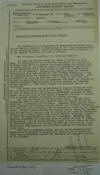
|
34. February 3,
1932. Naval Attaché,
Tegucigalpa. "Propaganda
Bulletins Sent Out By Sandino,"
p. 1.
"The following is a translation
of propaganda bulletins sent out
by Sandino, received in
Tegucigalpa by the local
representative of the associated
press. These bulletins bore what
is believed to be the genuine
signature and seal of Sandino. ¶
“Our Offensive, Dignifying the
National Honor.--- ¶ Our Army
has started since the month of
October of last year, the
unrollment of our offensive
dignifying the Nicaraguan
National Honor which we propose
to finish during the current
year, to impede through the
force of right the fraudulent
machinations of the ellections
[elections] which they intend to
hold with foreign supervision in
the country. Columns have gone
out from our General
Headquarters with this object
who will interne themselves in
all the Departments of our
Republic, including that of
Managua. Also in addition to
these we have sent out a total
of 1600 men with 36 machine guns
and 500 lbs. of dynamite; all
under the command of General
Francisco Estrada, with whom
will operate the Generals Carlos
Salgado P., Juan Pablo Umanzor
and Colonels Padilla and
Altamirano. ¶ Our forces have
the instructions to augment
themselves with men and arms and
keep a line on the enemy, until
the undersigned is able to take
one of the principle department
capitals of Nicaragua, which act
will be the signal designated
for them to proceed with a
general movement involving the
entire country. ¶ Our Army is
formed in the following order:
General Pedro Altamirano with
700 men and 9 machine guns to
operate in the departments of
Matagalpa and Jinotega. Generals
Pedro Antonio Irias, Simón
Gonzalez and Colonels Abraham
Rivera and Perfecto Chavarria,
with 1000 men and 10 machine
guns to harrass [harass] the
enemy on the Atlantic coast.
General Ismael Peralta and
Colonel Daniel Hernandez
Mayréna, with 300 men and 4
machine guns to hostilize the
enemy in Chontales. General Juan
Santos Morales and Colonel
Ruperto Hernandez Roblero, to
cover the departments of León
and Chinandega. Generals Juan
Gregorio Colindres and Jose Leon
Diaz to remain on duty in these
Headquarters. On the border
between Costa Rica and Rivas, we
have as immediate Jefes of our
forces, heroic and intellectual
young men who are well known in
the political circles of
Nicaragua and Costa Rica. ¶ Our
Army is increased daily, and all
of our expeditionary Leaders are
authorized to appoint new Jefes
who will operate in their own
neighborhood against the
invaders and dogs and traitors
of the country. ¶ (See Page
Two-------- . . . "
|
|
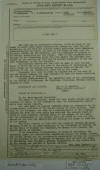
|
35. February 3,
1932. Naval Attaché,
Tegucigalpa. "Propaganda
Bulletins Sent Out By Sandino,"
p. 2.
" . . . Our Army has no
information service, which we
leave to the enemy to enact
whose false informations always
say that they are destroying us
and that our bullets barely
perforate their sombreros.
Notwithstanding the fact, our
Army is now ready to take over
the military control of the
Republic, but they continue to
pretend to be fooling themselves
and the public. Part of the
responsibility belongs to the
Nicaraguan press who have caused
the greatest confusion in the
country and will now be greatly
surprised to see our Army
triumphant in all the Republic.
¶ Our military operations they
will be made to feel through
fault of their own as in the
case of the taking of
Chichigalpa and other towns, as
the public observer should learn
to believe the opposite of all
the information given out by the
enemy. ¶ Nicaragua will only be
freed by bullets and at the cost
of our own blood; because our
Army proposes to stop the farce
elections and the shameless of
Nicaragua. ¶ General
Headquarters of the Defensive
Army of the Sovereignty of the
Nation of Nicaragua; The
Segovias, Nicaragua, Central
America, January 1, 1932. ¶
FATHERLAND AND LIBERTY. ¶ (s) A.
C. Sandino. ¶ CESAR AUGUSTO
SANDINO.” ¶ (Seal) ¶ “PEACE IN
NICARAGUA.-- ¶ To the
Indo-Spanish observers: ¶ The
peace in Nicaragua, since the
very start, exists and will
continue to exist, in the
conception that the Indo-Spanish
governments have racial dignity.
¶ Our Army does not sustain
bandalic ideas as propagated by
the international politics of
the United States of North
America. Very much to the
contrary, our Army is a
representative of the Hispanic
dignity and from the very start
has accepted the unequal fight
in which we find ourselves
through shame of the people of
our race; but the governments of
our people, have not cared or
have not perceived as yet that
our sacrifices are through the
shame of them and of our people.
¶ Our fight started in 1912 with
the death of General Benjamin
Zeledon, which is the same
beginning of the inviction of
Bolivar and is the ideal of
Bolivar was vandalic, we accept
with pleasure the qualification
of BANDITS. ¶ It is considered
indispensable to think of
abolishing the treaties, pacts
and conventions; celebrated
behind our backs, between the
United States and the
governments established by them
in Nicaragua. To the contrary we
are persuaded to believe that we
have the means of abolishing
them through a general
reclamation of our rights made
by the twenty one publics of
Spanish America. ¶ (See Page
Three------- . . . "
|
|
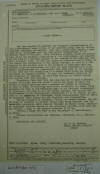
|
36. February 3,
1932. Naval Attaché,
Tegucigalpa. "Propaganda
Bulletins Sent Out By Sandino,"
p. 3.
" . . . Our Army aspires to
conceive the Hispanic
nationalization of the
inter-oceanic canal route, of
the possible naval base in
Central American Territory and
waters. With this motive there
exists a project which
originated with our Army called
“REALIZATION OF THE SUPREME
DREAM OF BOLIVAR”. This
redeeming project, which was
elaborated on by the personal
inspiration of the undersigned,
was inspired at the foot of a
mountain jungle in the forests
of our Segovias, the 20th of
March, 1929. In the same epoca
an invitation was extended to
the twenty one governments of
our Racial America, so that in a
conference in the capital city
of the Republic of Argentina
that our project might be
recognized. But with the same
dissimulation which always
characterizes our governments
they were deaf to the calling of
our Army for the recognition of
a common right which has always
pertained to Hispano-America. We
make the honorable exception of
the President of Salvador, at
that time Doctor Pio Romero
Bosque, who replied with full
dignity. ¶ Therefore, from that
time our Army has had to pass
different phases, including that
for which I was at the point of
being the victim of closed
policies when I crossed the
border of Nicaragua in June of
1929, to seek help with which to
sustain the cause which pertains
not only to Our Defensive Army
of the National Sovereignth
[Sovereignty] of Nicaragua, but
also to all our Racial America.
The unjustified indifference of
the Indo-Spanish governments is
of no import, in the face of the
suffering of Nicaragua, which
distinguishes them as unfit to
represent their people who are
dignified and conscientous
[conscientious]. ¶ The
Ex-President of Salvador, Doctor
Pio Romero Bosque, the
Ex-Minister of Salvador in
Mexico, Doctor Juan Ramon
Uriarte, and the benevolent
patriarch Señor Joaquin Trincado
in Buenos Aires, Republic of
Argentina conserve copies of our
mentioned project, from whom you
may solicit a copy of the
project referred to by us. ¶
Wishing a Happy New Year to all
our people of Indo-Hispano, in
1932.- ¶ General Headquarters,
Las Segovias, Nicaragua, C.A.,
January, 1, 1932. ¶ FATHERLAND
AND LIBERTY. ¶ (s) A. C.
Sandino, ¶ CESAR AUGUSTO
SANDINO” ¶ (Seal) ¶ COPY
FURNISHED: Hqtrs.
USMC,/COMSPERON,/sec. Brig.
Managua."
|
|
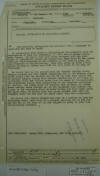
|
37. January 30,
1932. Naval Attaché,
Tegucigalpa. "Reliable
Information Re Nicaraguan
Bandits."
"The following information was
received from a messenger of
Sandino’s who came to Danlí: ¶
He accompanied Juan Gregorio
Colindres on his incursion into
the departments of Leon and
Chinandega and left him at
Sabana Grande near Jicaro. He
stated that this group returned
with two pack loads of
Springfield rifles and
ammunition, that about 50 men
joined them but later deserted
in the vicinity of San Juan de
Limay and San Francisco de
Cuajiniquilapa. That this group
on their return passed through
La Pavona near Yalí and from
there to San Juan de Telpaneca.
¶ He stated that in the contact
with the Guardia Sandino barely
escaped capture and that Rafael
Altamirano was in the advance
guard which fought with the
Guardia and two of his sons were
killed but he escaped unhurt;
during this contact Sandino was
in the house of Altamirano about
two hundred yards from the scene
of the encounter. The Altamirano
family have always been in the
complete confidence of Sandino.
The woman which the Guardia took
prisoner to Jicaro knows exactly
where Sandino is, as the
messenger said Sandino has a
zone in the mountains which he
never leaves and this woman
knows the place well. He stated
that this group crossed over
onto the Guiguili trail but are
near the point where they were
surprised. ¶ He stated that
Carlos Salgado has left on a
mission to Leon and Chinandega
where there will be a general
uprising but he did not say who
was at the head of it, and
Salgado is going to join this
revolutionary movement. ¶ COPY
FURNISHED: Hqtrs USMC,
Comsperon, 2nd Brig. Managua."
|
|
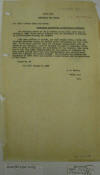
|
38. January 7,
1932. Major A. R. Harris,
San José. "Government
Supervision of Nicaraguan
Criminals," report on press
report in
La Tribuna,
San José.
"COSTA RICA ¶ POPULATION AND
SOCIAL ¶ No. 2700 – Public Order
and Safety. ¶ Government
Supervision of Nicaraguan
Criminals. ¶ The following
report in the La Tribuna of San
José, Costa Rica of January 6,
1932, would seem to indicate
that the Government is checking
up on Nicaraguans crossing the
border:- ¶ “The jefe político of
Tilarán, don José Joaquín Ortiz,
visited the President yesterday
asking for certain public
necessities for that locality.
In the first place he asked for
telegraph communication with San
Rafael de los Guatuzos, a port
of entrance and exit of
criminals, coming from and going
to Nicaragua; the authorities of
that frontier town having had no
less than fifty communications
for the capture of criminals who
have passed through there and
these communications were
received weeks after the
criminals has passed through.
The President has accepted the
suggestion of Señor Ortiz and
possibly a radio station will be
established in San Rafael. ¶
Report No. 23 ¶ San José,
January 7, 1932 ¶ A. R. Harris,
¶ Major, G.S. ¶ M.A."
|
|
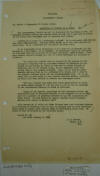
|
39. January 6,
1932. Major A. R. Harris,
San José. "Activities of
Salomón de la Selva."
"NICARAGUA ¶ POPULATION & SOCIAL
¶ No. 2900-c – Propaganda of
Foreign Origin. ¶ Activities of
Salomon de la Selva. ¶ The
accompanying “Public Letter” is
forwarded for the files of G-2.
It probably contains nothing not
already known to G-2, but I can
find no record of its having
been forwarded when it appeared
last Spring. ¶ Salomon de la
Selva is a Nicaraguan refugeé.
He is violently anti-Moncada and
quite anti-American. Although
often drunk, he is the best
reporter in Costa Rica. He is a
reporter for the Diarío de Costa
Rica. ¶ He is constantly doing
everything in his power to put
Moncada and the Marines in a bad
light. As an example: In
yesterday’s paper he published
an interview with the Secretary
of Foreign Relations, Señor
Pacheco. There were various
matters touched on,- but of
course Nicaragua was included as
follows:- ¶ “We asked Lic.
Pacheco what he thought of the
passage in the message to
Congress made by President
Moncada of Nicaragua in the
middle of last month, in which
he referred to having thought of
declaring war on the country
which, in his judgment, gave
such strong help to the Sandino
movement. Also, in his message
Señor Moncada declared that he
was prevented from taking such a
step by the Central American
Pacts and the Briand-Kellogg
Pact. It is assumed that he must
refer to some Central American
Nation, otherwise it would have
been foolish to mention the
Washington Pacts. ¶ “The Lic.
Pacheco responded that these
declarations of which we spoke
seemed strange to him and that
as yet he had no knowledge of
the Presidential Message to
which we referred. ¶ “Owing to
the unusual importance of the
Washington Pacts, any
declaration made by President
Moncada to the Congress of his
country must be a question of
profound interest to all the
signatories of those Pacts. On
what Nation in Central America
would President Moncada have
wished to declare War?” ¶ Both
Salomon de la Selva and Señor
Pacheco knew that President
Moncada was referring to
Honduras,- but it will be
noticed that in this interview,
Selva makes it appear that
Moncada might be threatening
Costa Rica. He tries to stir up
trouble by all available means.
¶ Report No. 21 ¶ San José,
January 6, 1932 ¶ A. R. Harris,
¶ Major, G.S. ¶ M.A."
|
|
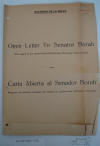
|
40. January 1932.
Salomón de la Selva, "Open
Letter to Senator Borah with
regard to the recent
Honduras-Nicaragua Boundary
Treaty Scandal," Imprenta "La
Tribuna," San José de Costa
Rica, p. 1.
"SALOMON DE LA SELVA ¶ Open
Letter To Senator Borah ¶ With
regard to the recent
Honduras-Nicaragua Boundary
Treaty Scandal ¶ Carta Abierta
al Senador Borah ¶ Respecto del
reciente escándalo del Tratado
de Limites entre Honduras y
Nicaragua . . . "
|
|
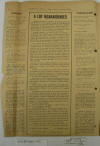
|
41. January 1932.
Salomón de la Selva, "Open
Letter to Senator Borah with
regard to the recent
Honduras-Nicaragua Boundary
Treaty Scandal," Imprenta "La
Tribuna," San José de Costa
Rica, p. 2.
"SALOMON DE LA SELVA. – CARTA
ABIERTA AL SENADOR BORAH ¶
ORIGINAL ¶ San José de Costa
Rica, C. A. ¶ February 21, 1931.
¶ To the Hon. William E. Borah,
¶ Senator of the United States,
¶ Senate Office Building, ¶
Washington, D. C. ¶ My dear
Senator; ¶ La Noticia, a
Managua, Nicaragua, daily,
published on February 12 of this
year, certain statements made in
the course of an interview by
the Hon. Matthew Elting Hanna,
United States Minister to
Nicaragua; it is my duty to
inform the Committee on Foreign
Relations of the United States
Senate, of which you are the
chairman, with regard to these
statements. Enclosed please find
a clipping containing the
interview in full. ¶ I translate
Mr. Hanna’s statements in part,
as follows: ¶ “Our (La Noticia)
representative asked Mr. Hanna
what was his opinion with
respect to the Boundary Treaty
with Honduras, and he (Mr.
Hanna) expressed himself in the
following manner: ¶ “My opinion
is that the Treaty is
magnificent (excellent). It
would be a great achievement for
President Moncada if he succeeds
in having it passed (ratified).
It will be of great benefit to
Nicaragua”. ¶ “Our
representative interrupted him:
¶ “—But the people of Nicaragua
as a whole reject that Treaty
because it wounds (cuts into)
our territory. ¶ “Mr. Hanna
replied: ¶ “—I am not surprised
that the Treaty should have
opposition because at this time,
the great benefits that it will
bring to Nicaragua are not seen.
The beneficial consequences will
come later, and then they” (the
opposition, that is, “the people
of Nicaragua as a whole”) “will
understand that the step which
this Government (of Nicaragua)
is trying to take is
magnificent. ¶ “Also the Treaty
would contribute to the
pacification of the North” (the
Sandino region) “because the
commission of engineers that
will mark out the boundary will
have to be protected in its work
by forces of Honduras and
Nicaragua in order to avoid an
attack from the brigands”
(forces of the Army of
Liberation commanded by Gen.
Sandino). “Besides, that
boundary dispute should be
settled in a friendly manner in
order to avoid later on a
conflict between the two
countries”. ¶ A LOS
NICARAGÜENSES ¶ Acabamos de
saber por periódicos de Managua
que nos han llegado hoy, la
viril y magnifica actitud de los
estudiantes de Derecho ante el
crimen que constituye la entrega
a Honduras del territorio en
litigio cuando bien se podria
arreglar co: el pais hermano la
partición equitativa de dicho
territorio, ya que el laudo del
Rey de España nos quita algo que
siempre ha sido nuestro y que no
fue sometido al arbitraje. ¶
Queremos declarar a ese soberbio
grupo de estudiantes, a la
juventud toda y al pueblo entero
de Nicaragua, que estamos en
posesión del negocio secreto que
esa traición encierra, secreto
que hemos guardado respetando la
confidencia amistosa en que lo
supimos, pero que estamos
dispuestos a revelar ante el
peligro de la desmembración
estúpida de nuestra Patria, ya
que la Patria está por sobre la
amistad y por sobre todo. ¶ Una
compañia extranjera (yanqui)
está interesada en explotar los
pinares de la Mosquitia en el
territorio en disputa. Esta
compañia obtuvo una concesión
del Gobierno del Nicaragua,
concesión que fue cancelada por
dicha compañia debido a las
protestas de Honduras. Pero los
hombres del actual Gobierno
nicaragüense, por la vergonzosa
suma de setenta y cinco mil
dólares—que aquí hacen el papel
de los treinta dineros de
Judas—que dicha compañia les
tiene ofrecidos a ellos
personalmente para sus bolsillos
particulares, ceden a Honduras
el suelo nuestro, con la precisa
condición de respetar los
compromisos que haya contraído
Nicaragua, que no son otros que
dicha concesión. ¶ Acusamos al
señor José Maria Moncada de
recibir parte de esos setenta y
cinco mil dólares por llevar a
cabo esa negociación en su
carácter de Presidente de la
República de Nicaragua. ¶
Acusamos al Dr. Julián Irias de
haber estado a sueldo de esa
compañia para hacer gestiones al
respecto, y de ser otro de los
que recibirán parte del botin de
los setenta y cinco mil dólares
por consumar la negociación en
su carácter de Ministro de
Relaciones Exteriores de
Nicaragua. ¶ Acusamos al Dr.
Félix Esteban Guandique de
parcial e in teresado, puesto
que él es el abogado que ha
dirigido y activado esas
gestiones, apoderado de la
compañia y participe también en
el botín. ¶ Podemos aducir
pruebas concluyentes que
respaldan nuestras acusaciones.
Conocemos todas las gestiones
del Dr. Guandique en Nueva
Orleans y los pormenores el la
immunda negociación. ¶ No
disponemos de más tiempo por el
momento para entrar en
pormenores. Está al cerrarse la
valija del correo aéreo y
queremos que estas lineas
lleguen cuanto antes a
Nicaragua. Pero excitamos a
nuestros compatriotas, a ese
valiente grupo estudiantil, a
los obreros, y a todos aquellos
que aún sienten vibrar en su
corazón el amor a la patria,
para que, sobreponiéndose a todo
partidarismo insano, eleven sus
voces de protesta ante tamaña
infamia. ¶ Ya no se trata del
entreguismo a cambio de poder
sino de la venta descarada e
impúdica. ¶ Desvergonzadamente
se propala que Nicaragua cede lo
que en derecho no cedería nunca,
obligada a ello por la promesa
dada por Honduras de ayudar a
debelar el invicto movimiento
libertador del General Sandino.
Esta especie constituye de por
sí otra intamia que hay que
desnudar. El móvil verdadero de
la sucia negociación es lo que
aquí dejamos dicho: los setenta
y cinco mil dólares de la
compañia yanqui para los
degradados vendepatria que a tan
bajo precio se están cotizando
en la almoneda de las esteras
oficiales de Nicaragua. ¶ En
próximo lolleto que publicaremos
cuanto antes, conocerá el pueblo
de Nicaragua toda esta
negociación ignominiosa. ¶
SALOMON DE LA SELVA. ¶ A ORTEGA
DIAZ. ¶ San José de Costa Rica a
13 de febrero de 1931. ¶
TRADUCCION ¶ San José de Costa
Rica, C. A., a 21 de febrero de
1931. ¶ Al Hon. William E.
Borah, Senador de los Estados
Unidos, ¶ Edificios de las
Oficinas del Sendado. ¶
Washington, D. C. ¶ Mi querido
Senador: ¶ La Noticia, diario de
Managua, Nicaragua, publicó el
12 de febrero de este año
ciertas declaraciones, hechas en
el curso de una entrevista, del
Hon. Mr. Matthew Elting Hanna,
Ministro de los Estados Unidos
en Nicaragua; es mi deber
informar a la Comisión de
Relaciones Exteriores del Senado
de los Estados Unidos, que usted
preside, con respecto a esas
declaraciones. Adjunto sirvase
hallar un recorte que contiene
[unreadable] entrevista entera.
Traduzco las declaraciones de
Mr. Hanna en parte, como sigue:
¶ “Nuestro representante” (de La
Noticia) “preguntó a Mr. Hanna
cuál era su opinión respecto al
Convenio de limites con Honduras
y se produjo: (Mr. Hanna) “de la
siguiente manera: ¶ “—Mi opinión
es que el Convenio es magnifico.
Sería un gran triunfo del
Presidente General Moncada si
logra que sea aprobado. Será de
grandes beneficios para
Nicaragua”. ¶ “Nuestro
representante le interrumpió: ¶
“—Pero el pueblo de Nicaragua en
conjunto rechaza ese Convenio,
señor Ministro, por lesionar
nuestro territorio. ¶ “Mr. Hanna
repuso: ¶ “—No me sorprende que
tenga oposición el Convenio
porque al momento no se ven los
grandes beneficios que traerá
para Nicaragua. Las
consecuencias benéficas vendrán
más tarde y entonces
comprenderán” (los
oposicionistas, esto es, “el
pueblo de Nicaragua en
conjunto”) “que es magnifico el
paso que trata de dar este
Gobireno. ¶ “También el Convenio
contribuirá a la pacificación
del Norte” (la región de
Sandino) “porque la comisión de
ingenieros que demarcará la
ireatera tendrá que ser
protegida en su labor por
fuerzas de Honduras y Nicaragua
para evitar un ataque de los
bandoleros” (fuerzas del
Ejército Libertador que manda el
Gen. Sandino). “Además, esa
disputa de fronteras debe
arreglarse amistosamente para
evitar unás tarde un conflicto
entre ambos paises . . . "
|
|
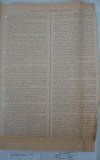
|
42. January 1932.
Salomón de la Selva, "Open
Letter to Senator Borah with
regard to the recent
Honduras-Nicaragua Boundary
Treaty Scandal," Imprenta "La
Tribuna," San José de Costa
Rica, p. 3.
" . . . SALOMÓN DE LA SELVA. –
CARTA ABIERTA AL SENADOR BORAH ¶
You will please observe that Mr.
Hanna’s advocacy of the Treaty
is based on three reasons:
First, it will be of great
benefit to Nicaragua. Second, it
would contribute to the
pacification of the Northern
part of Nicaragua. Third, it
would settle the boundary
dispute in a friendly manner. ¶
Taking the third reason first,
Mr. Hanna is absolutely in the
wrong. The people of Nicaragua
would forevermore resent the
high handed manner of settling
that dispute which the said
Treaty contemplates. It would
not be far-fetched to say that
the ratification of that Treaty
by the Nicaraguan Congress and
the consequent cession to
Honduras of a fifth part of the
territory of Nicaragua would
have created in the psychology
of Nicaraguans an
“Alsace-Lorraine complex,” which
might have led future
generations to possible war. ¶
Mr. Hanna’s second reason is
nothing short of despicable. It
means goading the Government of
Honduras to undertake the
pacification of that part of
Nicaragua in which the efforts
of thousands of United States
marines have so significantly
failed. Again, this intervention
that was sought of Honduras
altough [although] in the guise
of cooperation with the
Government of Nicaragua, would
have created an enmity between
the two peopples [peoples] not
easily blotted away. The vast
majority of the Nicaraguan
people believe that Gen. Sandino
is in the right. They would not,
without profound resentment, see
the forces of Honduras fighting
the forces of Gen. Sandino. Nor
do I believe that the people of
Honduras would tolerate such a
crime; rather, what Mr. Hanna
sees as a good measure, is to my
mind a dangerous step to take,
for it might involve the
Government [of] Honduras, a
country fortunately at peace,
into a war with its own
population such as the war
between the Moncada Government
and the people of Nicaragua as
represented by the army of Gen.
Sandino. ¶ But what of Mr.
Hanna’s first reason? What
benefits can Nicaragua possibly
derive from losing a fifth part
more or less of its territory? ¶
I have today received mail from
Nicaragua posted there last
night. My information is that up
to this date Mr. Hanna has not
disclaimed, denied or corrected
any of the statements attributed
to him by La Noticia, a paper,
by the way; of rabid
anti-Sandino partisanship. Mr.
Hanna’s quoted interview has
given the impression that your
great Government, for which he
is the authorized spokesman in
Nicaragua, is of the opinion
that he has expressed, all the
more so as Mr. Hanna, when he
gave that interview, had very
recently returned from
consultation over Nicaraguan
affairs with President Hoover
and Secretary of State Stimson
in Washington. ¶ On February
13th, inmediately [immediately]
upon learning of Mr. Hanna’s
statements, Mr. Adolfo Ortega
Díaz (exiled Nicaraguan
newspaper editor) and I saw fit
to address a memorial to the
people of Nicaragua making the
following accusation: ¶ 1.—That
a United States company, the
Louisiana Nicaragua Lumber Co.,
was back of the negotiation of
that boundary Treaty seeking to
secure from Honduras a valuable
concession in the disputed
territory. This concession had
been granted by the Nicaraguan
Government but could not be made
valid because of Honduras
opposition while the dispute
remained unsettled. ¶ 2.—That
Dr. Julián Irías, Minister of
Foreign Relations of Nicaragua
and Nicaraguan negotiator of the
Treaty, had been in the pay of
the Louisiana Nicaragua Lumber
Co. expressly to negotiate said
Treaty. ¶ 3.—That, besides
paying large amounts of money
(graft, that is to say) in order
to create a “favorable
atmosphere” for the Treaty, the
Louisiana Nicaragua Lumber Co.
had agreed to pay in Nicaragua,
through the Nicaraguan lawyer
Dr. Félix Esteban Guandique, the
sum of $75,000 (seventy five
thousand dollars) which it knew
was loot to be divided among
President Moncada, Minister
Irías, said Guandique and other
Nicaraguan parties. ¶ These
disclosures, attested to by Mr.
Ortega Díaz’s signature and
mine, were no strict secret.
Many who knew of these matters
were not in a position, however,
to make them public. First, they
had no evidence with which to
substantiate their charges; many
things may be known to be true
which, neverthless
[nevertheless], for lack of
evidence, cannot be proven so
before a tribunal. Secondly, the
Moncada regime is a cruel
despotism and to cross a despot
maintained in power by the
forces of the United States is
no light risk for a Nicaraguan
citizen to run. Those of us who
have been exiled from Nicaragua,
those that have been thrust in
prison, and the relatives of
those who have been executed,
know the bitterness of it not in
ourselves only but in the grief
and tribulation of our dearest
ones. For these reasons none
dared to speak out the truth in
Nicaragua. Mr. Ortega Díaz and I
undertook the fulfilment of […]
¶ Se servirá observar que el
alegato de Mr. Hanna a favor del
Tratado se basa en tres razones:
Primera, será de grandes
beneficios para Nicaragua.
Segunda, contribuirá a la
pacificación del Norte de
Nicaragua. Tercera, arreglaría
amistosamente la disputa de
fronteras. ¶ Si primero tomamos
la tercera razón, Mr. Hanna está
absolutamente equivocado. El
pueblo de Nicaragua se
resentiría para siempre de la
arbitraria manera que el Tratado
implica de arreglar esa disputa.
No sería exagerado decir que la
ratificación de ese Tratado por
el Congreso de Nicaragua y la
consecuente cesión a Honduras de
una quinta parte del territorio
de Nicaragua hubiera creado en
la psicologia de los
nicaragüenses un “complejo de
Alsacia-Lorena” que podría
llevar a las generaciones
futuras a la guerra. ¶ La
segunda razón de Mr. Hanna no es
nada menos que despreciable.
Significa azuzar al Gobierno de
Honduras a que emprenda la
pacificación de la parte de
Nicaragua en donde los esfuerzos
de millares de marinos de los
Estados Unidos han fracasado tan
significativamente. Por otra
parte, esa pretendida
intervención de Honduras, aun
cuando se disfrazara de
cooperación con el Gobierno de
Nicaragua, hubiera creado una
enemistad entre los dos pueblos
que no fácilmente se hubiera
borrado. La vasta mayoría del
pueblo nicaragüense cree que el
General Sandino tiene la razón.
No verían sin hondo
resentimiento a fuerzas de
Honduras atacar a las fuerzas
del General Sandino. Ni creo que
el pueblo de Honduras toleraría
semejante crimen; más bien, lo
que Mr. Hanna ve como buena
medida, es, a mi juicio,
peligroso paso a dar, porque
podría envolver al Gobierno de
Honduras, país que felizmente
goza de paz, en una guerra con
su propia población como la
guerra entre el Gobierno de
Moncada y el pueblo de Nicaragua
representado por el ejército del
General Sandino. ¶ Pero, ¿y la
primera razón de Mr. Hanna? ¿Qué
beneficios puede Nicaragua
posiblemente derivar de la
pérdida de una quinta parte más
o menos de su territorio? ¶ Hoy
he recibido correspondencia de
Nicaragua puesta al correo
auoche. Mi información es de que
hasta fecha de ayer Mr. Hanna no
ha desmentido, negado ni
corregido ninguna de las
declaraciones que le atribuye La
Noticia, periódico, dicho sea de
paso, de rabioso partidarismo
antisandinista. La entrevista de
Mr. Hanna que he citado ha dado
la impresión de que su gran
Gobierno de usted, del que él es
portavoz autorizado en
Nicaragua, es de la opinión que
él ha expresado, tanto más así
como que Mr. Hanna, cuando dió
la entrevista, acababa de
regresar de consultar acerca de
asuntos de Nicaragua con el
Presidente Hoover y el
Secretario de Estado Stimson en
Washington. ¶ El 13 de febrero,
inmediatamente que supimos de
las declaraciones de Mr. Hanna,
don Adolfo Ortega Díaz
(periodista nicaragüense
desterrado) y yo creímos
procedente dirigir un memorial
al pueblo de Nicaragua haciendo
la siguiente acusación: ¶ 1.—Que
una compañia de los Estados
Unidos (la Louisiana Nicaragua
Lumber Co.) estaba en el fondo
de ese Tratado de limites
procurando obtener de Honduras
una valiosa concesión en el
territorio en disputa. Esta
concesión había sido otorgada
por el Gobierno de Nicaragua
pero no podía hacerse válida por
la protesta de Honduras mientras
no se arreglaba el litigio. ¶
2.—Que el Dr. Julián Irías,
Ministro de Relaciones
Exteriores de Nicaragua y
negociador por parte de
Nicaragua del Tratado, había
estado a sueldo de la Louisiana
Nicaragua Lumber Co.
expresamente para negociar ese
Tratado. ¶ 3.—Que, además de
pagar grandes sumas de dinero
(soborno es decir) para crearle
una “atmósfera favorable” al
Tratado, la Louisiana Nicaragua
Lumber Co. se había comprometido
a pagar en Nicaragua, por medio
del abogado nicaragüense Dr.
Félix Esteban Guandique, la suma
de $75,000 (setenta y cinco mil
dólares) a sabiendas de que esa
suma era botín que se
repartirían el Presidente
Moncada, el Ministro Irías, el
dicho Guandique y otros
individuos de Nicaragua. ¶ Estas
revelaciones, respaldadas por
las firmas del señor Ortega Díaz
y mía, no eran un estricto
secreto. Muchos que sabían esta
cosas no estaban, sin embargo,
en condición de poder hacerlas
públicas. Primero, no tenían
pruebas con las cuales respaldar
sus cargos; muchas cosas se
pueden saber que son ciertas la
cuales, no obstante, por falta
de pruebas no pueden comprobarse
ante un tribunal. Segundo, el
régimen de Moncada es un
despotismo cruel y oponerse a un
déspota a quien mantienen en el
poder las fuerzas de los Estados
Unidos no es un riesgo ligero
que pueda correr un ciudadano de
Nicaragua. Aquellos de nosotros
que hemos [tear in paper]
expatriados de Nicaargua
[Nicaragua], aquellos que han
sido arrojados a [tear in paper]
cárcel, y las familias de los
que han sido ejecutados, sabemos
[tear in paper] amargura de esto
no sólo por nosotros mismos sino
por el dolor la tribulación de
nuestros seres más queridos. Por
estas razones nadie se atrevia a
decir la verdad en Nicaragua. El
señor Ortega . . . "
|
|

|
43. January 1932.
Salomón de la Selva, "Open
Letter to Senator Borah with
regard to the recent
Honduras-Nicaragua Boundary
Treaty Scandal," Imprenta "La
Tribuna," San José de Costa
Rica, p. 4.
" . . . SALOMÓN DE LA SELVA. –
CARTA ABIERTA AL SENADOR BORAH ¶
[…] that duty and have stated
that we can prove our
accusation. While in New
Orleans, whither the course of
exile took us last year, we were
able to get to the root of this
Treaty negotiation and to
unravel the entire filthy skein.
Is it possible that no inkling
of the scandalous deal between
the Louisiana Nicaragua Lumber
Co. and the Moncada Government
had reached the knowledge of the
United States Minister? I have
strong reasons for believing
that not only did Mr. Hanna have
rumors of this Nicaraguan
Tea-Pot Dome, but that he acted
with full knowledge of all that
was involved. ¶ On February
11th, the day of Mr. Hanna’s
interview, the Treaty was before
the Nicaraguan Congress for
ratification. It was being
timidly opposed there although
feeling throughout the country
was strongly against it and the
University of Managua had been
ordered closed on account of the
protests of the student body
against the Treaty. The
Executive was exerting great
pressure in order to have the
Treaty ratified. Now, in such a
situation, what effect could the
statements of the United States
Minister have on Congress? Mr.
Hanna is no irresponsible
individual. I for one recognize
in him great diplomatic ability.
I feel also—and in this I am
certainly not alone—that he was
conscious that his words would
have tremendous weight in a
Congress all the members of
which have been elected under
United States dictatorial
control of elections. ¶ Because
Mr. Ortega Díaz and I had the
honest courage to act as we did,
our lives have been threatened.
No newspaper in Nicaragua dared
print our accusation: A free
press is not to be expected
where United States marines
uphold a government. Our charges
nevertheless circulated
profusely in typerwritten
[typewritten] copies which we
had signed, and they were read
in Congress. The student body
and the laboring classes became
ever more determined in their
opposition of the Treaty, and
its ratification as originally
presented has for the time being
failed. ¶ What does the United
States Minister, Mr. Hanna, have
to say now? ¶ We are often told
that the denunciations are
unfair made by those of us in
Latin America who see a menace
to our national interests and to
our international peace in the
intervention of United States
forces in our political affairs,
in the officiousness of United
States diplomatic agents, and in
the methods of State
Department-backed United States
concession hunters. We are often
accused of speaking loosely and
passionately and of not being
able to substantiate our
charges. ¶ Now, this incident
that I have here related at some
length, is a concrete case. I
earnestly hope, I fervently
pray, that you Committee may
want to investigate it fully and
so realize what we are up
against in Latin America when
your marines, your diplomats and
your concession hunters join in
purpose. ¶ As this is a matter
of continental public interest I
am making this an open letter
with regard to which I trust
that your good self and
fellow-Senators will hear from
many fair-minded citizens of the
United States. Or is all hope of
a justice arrived at by
reasonable methods of exposition
and investigation a vain hope,
and is there nothing that we of
Nicaragua can do, who will not
submit to abjection, except kill
and be killed? ¶ Yours very
earnestly, ¶ SALOMON DE LA
SELVA. ¶ […] Díaz y yo
emprendimos el cumplimiento de
ese deber y hemos declarado que
podemos comprobar nuestra
acusación. Mientras estuvimos en
Nueva Orleans, hacia donde nos
llevó el curso de nuestro
destierro el año pasado, pudimos
dar con la raíz de la
negociación de ese Tratado, y
desenredar toda la madeja
immunda. ¿Será posible que
ningún eco de este escandaloso
negocio entre la Louisiana
Nicaragua Lumber Co. y el
Gobierno de Moncada haya llegado
a oídos del Ministro de los
Estados Unidos? Tengo fuertes
razones para creer que Mr. Hanna
tenía no sólo rumores de este
Tea-Pot Dome nicaragüense sino
que actuó con pleno conocimiento
de cuanto se tramaba. ¶ El 11 de
febrero, día de la entrevista de
Mr. Hanna, el Tratado estaba en
el Congreso de Nicaragua para su
ratificación. Allí se le hacía
tímida oposición aunque en todo
el país era fuerte el
sentimiento que había en su
contra y la Universidad de
Managua había sido clausurada
por las protestas de los
estudiantes en contra del
Tratado. El Ejecutivo estaba
ejerciendo gran presión para que
el Tratado fuese ratificado.
Ahora bien, en tal situación,
¿qué efecto podrían tener en el
Congreso las declaraciones del
Ministro de los Estados Unidos?
Mr. Hanna no es individuo
irresponsable. Por mi parte, le
reconozco gran habilidad
diplomática. Creo también, y en
esto estoy seguro de que no
estoy solo, que tenía conciencia
piena de que sus palabras
tendrían peso tremendo en un
Congreso todos cuyos miembros
han sido electos en elecciones
hechas bajo el control
dictatorial de los Estados
Unidos. ¶ Porque el señor Ortega
Díaz y yo tuvimos el valor
honrado de obrar de la manera
que lo hicimos nuestras vidas
han sido amenazadas. Periódico
ninguno en Nicaragua se atrevió
a publicar nuestra acusación:
Una prensa libre no se espera
donde marinos de los Estados
Unidos mantienen al Gobierno.
Nuestros cargos, sin embargo,
circularon profusamente en
copias escritas a máquina que
nosotros firmamos, y fueron
leídos en el Congreso. El cuerpo
estudiantil y las clases
laborantes afirmaron más que
nunca su determinación en contra
del Tratado, y la ratificación
que éste en la forma
originalmente presentada ha
fracasado por el momento. ¶ Y
hora, ¿qué tiene que decir el
Ministro de los Estados Unidos,
Mr. Hanna? ¶ Con frecuencia se
nos dice que son injustos los
ataques que hacemos aquellos de
nosotros en la América Latina
que vemos una amenaza para
nuestros intereses y para
nuestra paz internacional en la
intervención de las fuerzas de
los Estados Unidos en nuestros
asuntos politicos, en la
oficiosidad de los agentes
diplomáticos de los Estados
Unidos, y en los métodos que
emplean los caza-concesiones
estadounienses respaldados por
el Departamento de Estado. Con
frecuencia se nos acusa de
hablar sin coherencia y
apasionadamente y de no poder
corroborar nuestros cargos. ¶
Ahora bien, este incidente que
le he relatado, es un caso
concreto. Sinceramente espero,
fervientemente ruego, que su
Comisión quiera investigarlo
plenamente para que así se dé
cuenta de lo que tenemos en
contra en la América Latina
cuando los marinos, los
diplomáticos y los
caza-concesiones de ustedes unen
us propósitos. ¶ Como éste es
asunto de interés público
continental hago abierta esta
carta respecto de la cual confío
que su buena persona y sus
colegas del Senado recibirán
muchas cartas que les escriban
ciudadanos de los Estados Unidos
que sean justicieros. ¿O será
vana toda esperanza de obtener
justicia por medios razonables
de exposición y de investigación
y no habrá nada que podamos
hacer los de Nicaragua que no
nos someteremos a ninguna
abyección, excepto matar y ser
muertos? ¶ Muy sinceramente
suyo, ¶ SALOMON DE LA SELVA. ¶
Imprenta “La Tribuna”, San José
de Costa Rica"
|
|
|
|
|
End of Fat File on the
"Sandino Situation."
|
|
|
|
|
|
Number of digital
images, pp. 1-12: 593
|
|
|
Number of individual
documents, pp. 1-12:
486
|
|
|
|
United States National Archives, Record Group
165, Entry 77, Box 2653.
|
|
top of page |
|
|
